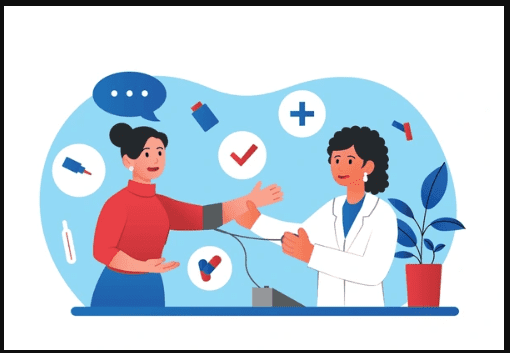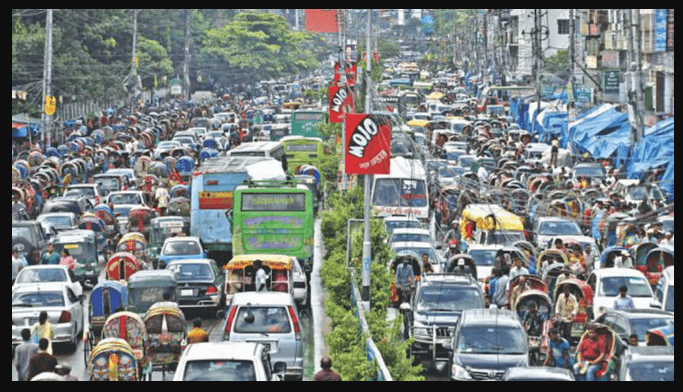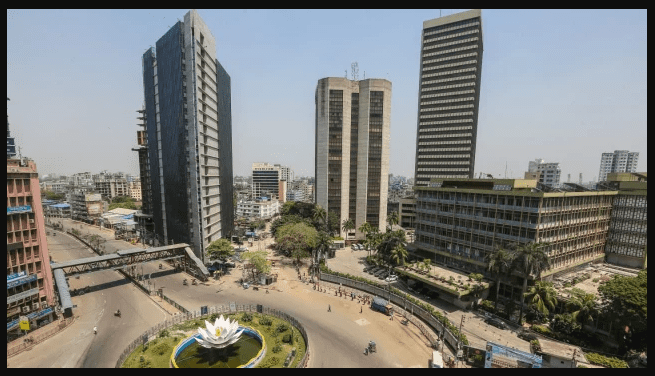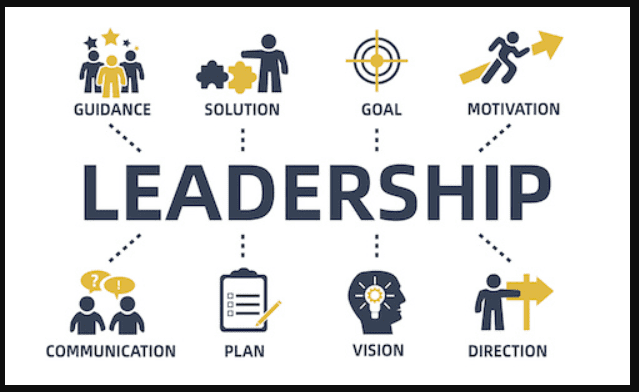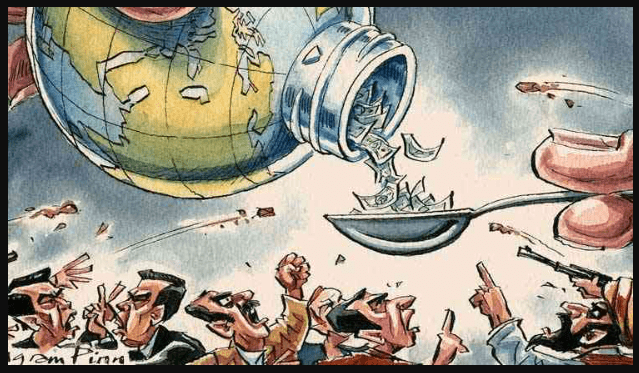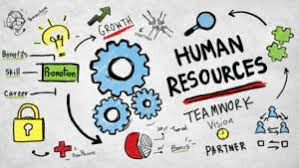
The poverty or weak morality which is responsible for corruption
Poverty can push people to do things they wouldn't normally do to survive. When people don't have enough money to feed their families or pay their bills, they might resort to corrupt practices as a way to make ends meet. This can include things like taking bribes or stealing from the government.
But it's not just about money. Weak morality, or a lack of strong ethical principles, can also contribute to corruption. When people don't see anything wrong with bending the rules or cutting corners, it opens the door to corrupt behavior. This can happen at all levels of society, from government officials to every people.
However, it's important to recognize that poverty and weak morality are not the only factors at play. Corruption is a complex issue with many root causes, including systemic flaws in governance, lack of accountability, and cultural attitudes towards honesty and integrity.
That being said, addressing poverty and promoting strong moral values can help reduce corruption. By providing people with opportunities for economic empowerment and education, we can help lift them out of poverty and reduce the temptation to engage in corrupt practices. Additionally, fostering a culture of honesty and integrity from an early age can help instill the values needed to resist corruption.
Poverty and weak morality may contribute to corruption, they are just part of the puzzle. Tackling corruption requires a comprehensive approach that addresses the root causes from all angles. By working together to promote economic opportunity and ethical behavior, we can build a more just and equitable society for everyone.
Terrorism is by product of corruption
Powered by Froala Editor
Corruption creates inequalities and injustices that can push people to extremes. When people feel like they're being treated unfairly or that the system is rigged against them, they might turn to terrorism as a way to fight back or gain attention for their cause.
Additionally, corruption can weaken governments and security forces, making it easier for terrorist groups to operate. When officials are more concerned with lining their pockets than protecting their citizens, it leaves gaps in security that terrorists can exploit.
Terrorism is a complex issue with many factors at play. While corruption may contribute to it, it's not the only cause. Ideological beliefs, social grievances, and geopolitical tensions also play significant roles.
That being said, tackling corruption is still crucial in the fight against terrorism. By promoting transparency, accountability, and good governance, we can create a more just and stable society where extremism finds less fertile ground to grow.
Corruption may fuel terrorism in some cases, it's not the whole story. We need to address the root causes of terrorism from all angles, including social, economic, and political factors. By working together to combat corruption and promote justice and equality, we can build a safer and more peaceful world for everyone.
Powered by Froala Editor
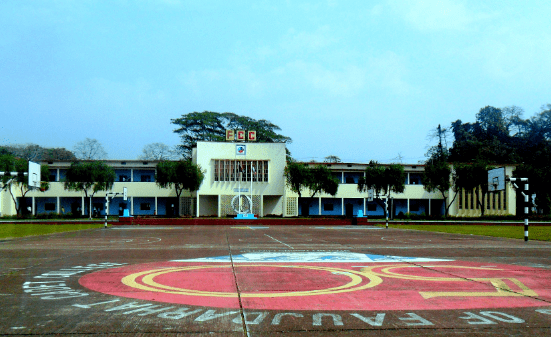
To increase knowledge we have to establish more cadet colleges
Cadet colleges offer a unique educational experience that focuses on leadership, discipline, and academic excellence. By providing a structured environment with a strong emphasis on character development, these colleges help students build valuable skills that will serve them well in their future endeavors.
Additionally, cadet colleges often offer specialized programs in areas like science, technology, engineering, and mathematics (STEM), as well as arts and humanities. This allows students to explore their interests and talents while receiving a high-quality education that prepares them for success in their chosen fields.
But it's not just about academics. Cadet colleges also promote teamwork, camaraderie, and a sense of community among students. By living and learning together in a supportive environment, students develop strong bonds and lifelong friendships that enrich their educational experience.
Moreover, cadet colleges provide opportunities for students to engage in extracurricular activities such as sports, arts, and community service. These activities help foster creativity, teamwork, and leadership skills while promoting a well-rounded education.
However, it's important to ensure that cadet colleges are accessible to all students, regardless of their background or socioeconomic status. By providing scholarships and financial assistance to students in need, we can ensure that everyone has the opportunity to benefit from the unique educational experience offered by cadet colleges.
Establishing more cadet colleges can be a fantastic way to increase knowledge and provide students with opportunities for personal and academic growth. By offering a well-rounded education that emphasizes leadership, discipline, and character development, cadet colleges prepare students to excel in their studies and make meaningful contributions to society. So, yes, let's invest in the future by expanding access to cadet colleges for students everywhere.
Tree plantation is the only way to reduce environmental pollution
Powered by Froala Editor
Trees are like nature's air purifiers. They soak up harmful gases like carbon dioxide and release oxygen, which we need to breathe. By planting more trees, we can help offset the pollution created by cars, factories, and other sources.
But that's not all. Trees also help to filter out pollutants from the air and water, making our surroundings cleaner and healthier for both humans and wildlife. They act as natural barriers, trapping dust, smoke, and other particles that can cause respiratory problems and other health issues.
Additionally, trees play a crucial role in combating climate change. As they grow, they absorb carbon dioxide from the atmosphere and store it in their leaves, branches, and roots. This helps to slow down the pace of global warming and reduce the impact of greenhouse gases on our planet.
Tree plantation alone may not be enough to solve all of our environmental problems. It's just one piece of the puzzle. We also need to address other sources of pollution, such as vehicle emissions, industrial waste, and deforestation.
That being said, tree plantation is still incredibly important. It's a simple and effective way for individuals and communities to make a positive impact on the environment. By planting trees in our neighborhoods, parks, and schools, we can create healthier, happier, and more sustainable communities for everyone.
Lastly, tree plantation is a powerful tool for reducing environmental pollution and fighting climate change. By harnessing the natural power of trees, we can create a cleaner, greener future for ourselves and future generations. So, let's roll up our sleeves and get planting!
Powered by Froala Editor
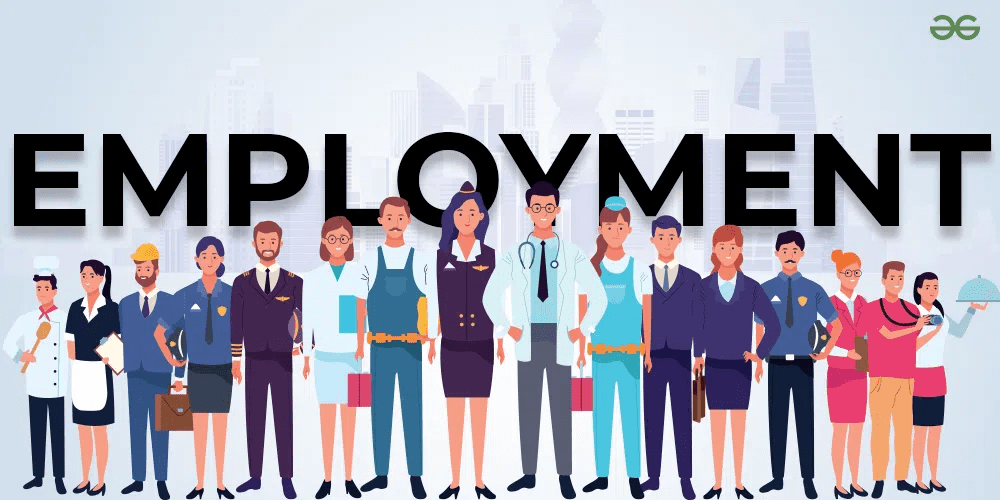
Using man power right way we can reduce unemployment problem in Bangladesh
Bangladesh has a huge workforce, with millions of people eager to work and contribute to the economy. By providing them with the right opportunities and training, we can harness this manpower to drive economic growth and create more jobs.
One way to do this is by investing in sectors that have the potential to generate employment on a large scale, such as agriculture, manufacturing, and services. By supporting small businesses and industries, we can create a ripple effect that boosts job creation and reduces unemployment rates across the country.
Additionally, we can focus on developing skills and expertise that are in demand in the global marketplace. By providing vocational training and education programs that align with the needs of industries both at home and abroad, we can empower workers to compete in the global economy and secure stable, well-paying jobs.
But it's not just about creating more jobs. We also need to ensure that these jobs are of good quality and provide fair wages and decent working conditions. By promoting labor rights and enforcing labor laws, we can protect workers from exploitation and ensure that they are able to support themselves and their families.
Moreover, we can encourage entrepreneurship and innovation by providing support and resources to aspiring entrepreneurs. By fostering a culture of entrepreneurship, we can empower individuals to create their own opportunities and become drivers of economic growth and job creation.
At the end, by using manpower wisely and investing in sectors with high potential for job creation, we can reduce the unemployment problem in Bangladesh. By providing workers with the right opportunities, skills, and support, we can create a brighter future for all. So, let's work together to unlock the full potential of our workforce and build a more prosperous and inclusive society.
Using of technology increase average life time of mankind
Powered by Froala Editor
Technology has revolutionized healthcare in ways we couldn't have imagined just a few decades ago. From advanced medical treatments to life-saving surgeries, technology has made it possible for doctors to diagnose and treat diseases more effectively than ever before. This means that people are living longer because they have access to better healthcare.
But that's not all. Technology has also led to major breakthroughs in preventive care and early detection. With tools like genetic testing and wearable devices, people can monitor their health in real-time and catch potential problems before they become serious. This proactive approach to healthcare is helping to prevent diseases and prolong lives.
Additionally, technology has improved our quality of life in countless ways. From safer transportation to better nutrition, advancements in technology have made it easier for people to stay healthy and active as they age. This means that people are not only living longer, but they're also living better.
Technology alone isn't enough to increase the average lifespan of mankind. We also need to address social and environmental factors that impact health, such as poverty, inequality, and pollution. By tackling these issues alongside advancements in technology, we can create a world where everyone has the opportunity to live a long and fulfilling life.
The use of technology is playing a major role in increasing the average lifespan of mankind. By improving healthcare, promoting preventive care, and enhancing quality of life, technology is helping people around the world live longer and healthier lives. So, let's embrace the power of technology and continue working towards a future where everyone can enjoy a long and fulfilling life.
Powered by Froala Editor

Village life is better than urban life
Village life is often seen as more peaceful and close-knit. In villages, people know each other by name and look out for one another. There's a strong sense of community, with neighbors helping each other out in times of need. This kind of support system can make life feel more fulfilling and meaningful.Additionally, village life tends to be less hectic and stressful than urban life. There's less noise and pollution, and things move at a slower pace. This can be a welcome change for people who are tired of the hustle and bustle of city living.Moreover, village life offers a deeper connection to nature. With open fields, lush greenery, and clean air, villages provide a tranquil environment where people can relax and recharge. This connection to nature can have a positive impact on mental and physical well-being. Village life also has its challenges. Access to healthcare, education, and other essential services can be limited in rural areas. Jobs may be scarce, and opportunities for personal and professional growth may be limited.On the other hand, urban life offers a wide range of amenities and opportunities. Cities are hubs of culture, commerce, and innovation, with access to top-notch healthcare, education, and entertainment options. Plus, cities offer more job opportunities and higher wages for many people.Finally, whether village life is better than urban life depends on individual preferences and priorities. While village life may offer a sense of community, peace, and connection to nature, urban life provides access to amenities, opportunities, and a vibrant social scene. Ultimately, both lifestyles have their pros and cons, and it's up to each person to decide which one is the best fit for them. So, let's celebrate the diversity of life and appreciate the beauty of both village and urban living.

Wide spreading of satellite channel is destroying our young generation
Satellite channels often broadcast content that may not be suitable for young viewers. From violent shows to inappropriate language and themes, there's a lot out there that can negatively influence impressionable minds. This can lead to desensitization to violence, unhealthy attitudes towards relationships, and even behavioral issues.
Additionally, excessive screen time, especially in front of satellite channels, can have detrimental effects on children's physical and mental health. Spending too much time watching TV can lead to a sedentary lifestyle, obesity, and sleep problems. It can also impact cognitive development and academic performance.
Moreover, satellite channels often promote materialism and unrealistic beauty standards, which can negatively impact young people's self-esteem and body image. Constant exposure to advertisements for expensive products and idealized images of beauty can create feelings of inadequacy and foster a culture of consumerism.
It's not all bad. Satellite channels can also be a source of entertainment, education, and cultural enrichment. There are many channels that air informative documentaries, educational programs, and family-friendly content that can inspire and educate young viewers.

Women empowerment is the only cause for increasing rate of divorce
Women empowerment means women have more rights and opportunities, including the ability to pursue education, careers, and financial independence. With these opportunities, women may feel more confident and empowered to leave unhappy or abusive marriages, leading to an increase in divorces.
Additionally, as women gain more independence and agency in decision-making, they may be less willing to tolerate unhappy or unequal relationships. This shift in mindset can lead to more divorces as women prioritize their own well-being and pursue relationships that are fulfilling and equitable.
Moreover, changes in societal norms and attitudes towards divorce have made it more socially acceptable for women to end marriages that are no longer serving them. In the past, divorce was often stigmatized, especially for women, but as society becomes more progressive, there's less stigma attached to divorce, making it a more viable option for unhappy couples.
Attributing the increase in divorce rates solely to women empowerment oversimplifies a complex issue. Divorce rates are influenced by a variety of factors, including changes in marriage norms, economic conditions, and individual preferences. Women empowerment may be a contributing factor, but it's not the only cause.
Women empowerment may play a role in the increasing rate of divorce, it's just one piece of the puzzle. As women gain more rights and opportunities, it's natural that divorce rates may rise as women feel empowered to leave unhappy marriages. However, it's important to consider the broader societal and cultural factors at play when discussing divorce rates. So, let's continue to support women empowerment while also addressing the underlying issues that contribute to marital dissatisfaction and divorce.
Working mothers are better mothers than housewives
Powered by Froala Editor
Working mothers often bring a unique perspective and valuable experiences to parenting. Balancing a career and family requires strong time management skills, resilience, and adaptability, qualities that can benefit children as well. By juggling multiple responsibilities, working mothers demonstrate to their children the importance of hard work, perseverance, and pursuing one's passions.
Additionally, working mothers serve as positive role models for their children, especially their daughters. By showing that women can succeed in both their careers and their personal lives, working mothers inspire their children to dream big and strive for their goals. This can instill confidence and ambition in children, empowering them to pursue their own aspirations.
Moreover, working mothers often bring financial stability to the family, which can have numerous benefits for children. Economic security allows families to provide for their children's basic needs, such as food, clothing, and education, as well as opportunities for enrichment, extracurricular activities, and travel. This can contribute to children's overall well-being and future success.
Being a good mother isn't determined by whether you work outside the home or not. Housewives play a crucial role in nurturing and caring for their children, providing love, support, and stability in the home. They may have more time to spend with their children and be more involved in their day-to-day lives.
Whether working mothers are better mothers than housewives is subjective and depends on individual circumstances and preferences. Both working mothers and housewives have unique strengths and challenges, and what's most important is that children receive love, support, and guidance from their caregivers, regardless of their employment status. So, let's celebrate the diversity of motherhood and understand that there's no one-size-fits-all approach to parenting.
Powered by Froala Editor
Working women spoil the family peace and harmony
Powered by Froala Editor
Working can make women feel stressed and tired, which can lead to arguments at home. It might also change how things are done in the family, which can upset some family members. For example, if a woman is too busy with her job, others might feel ignored.
When women work, they might not have as much time for their families. This can make family members feel sad or lonely. It can also make it hard for everyone to spend time together and feel close.
But it's not all bad. Working women can bring in money to support the family. They can also show their children that it's important to work hard and have a career.
In the end, whether women working causes problems in the family depends on many things. It's important for families to talk openly and support each other, no matter what.
Powered by Froala Editor
Student politics should be banned from the nation politics
Powered by Froala Editor
Student politics can sometimes get messy. It's supposed to be about student issues and making campus life better, but sometimes it spills over into national politics, and things can get pretty heated. This can distract from what really matters and lead to unnecessary drama.
Another thing is that student politics can be divisive. Instead of bringing people together, it can create rifts and conflicts that make it harder to work together towards common goals. Plus, it's not fair to expect students, who are still learning and growing, to handle the pressures of national politics.
But wait, there's more! Some people worry that student politics can be a breeding ground for corruption and power struggles. When young people see their peers climbing the political ladder, they might think it's okay to cut corners or bend the rules to get ahead. This sets a dangerous precedent for the future of our nation.
Now, I know what you might be thinking: "But shouldn't students have a say in politics?" Absolutely! Student voices are super important, and there are plenty of ways for students to get involved in issues that matter to them without diving into the murky waters of national politics.
Student politics has its place, maybe it's time to keep it separate from the big leagues. Let's focus on creating opportunities for students to get involved in meaningful ways that don't put them in over their heads. After all, they're the future leaders of our nation, and we want them to succeed. So, let's give them the support and guidance they need to make a positive impact without getting caught up in the chaos of national politics.
Powered by Froala Editor
Smuggling is the main threat to our national economy
Powered by Froala Editor
Smuggling happens when people sneak goods into or out of a country without paying taxes or following the rules. This might include things like drugs, counterfeit products, or even illegal weapons. You see, when goods are smuggled, the government misses out on taxes and revenue that could be used to help our country grow and thrive.
But that's not all. Smuggling also hurts local businesses by flooding the market with cheap, illegal goods. This makes it hard for honest businesses to compete and stay afloat. Plus, it can lead to job losses and economic instability in our communities.
Another thing to consider is that smuggling often involves organized crime groups and gangs. These groups can bring violence and corruption into our neighborhoods, making them less safe for everyone.
Now, I know what you might be thinking: "What can I do about smuggling?" Well, the truth is, we can all play a part in fighting it. By reporting suspicious activities to the authorities and refusing to buy smuggled goods, we can help protect our economy and our communities.
Smuggling poses a real threat to our national economy. It robs the government of much-needed revenue, hurts local businesses, and fuels crime and instability. But by working together and staying vigilant, we can stand up against smuggling and build a stronger, more prosperous future for all of us. So, let's keep our eyes open and do our part to keep our economy safe and sound.
Powered by Froala Editor
Sexual education should be compulsory in primary education
Powered by Froala Editor
Sexual education helps kids understand their bodies and feelings. It teaches them about things like puberty, reproduction, and relationships in a way that's easy to understand. This knowledge is super important for staying safe and making healthy choices as they grow up.
Another thing is that sexual education promotes respect and understanding. By learning about different genders, identities, and boundaries, kids can develop empathy and kindness towards others. This helps create a safer and more inclusive environment for everyone.
But wait, there's more! Sexual education also helps prevent things like unwanted pregnancies, sexually transmitted infections (STIs), and sexual abuse. When kids have accurate information about sex and relationships, they're better equipped to make informed decisions and protect themselves.
Now, I know what you might be thinking. Some people worry that sexual education is too sensitive or inappropriate for young kids. Sexual education can be taught in a way that's age-appropriate and respectful of cultural beliefs and values. It's all about providing kids with the knowledge and skills they need to navigate the world safely and confidently.
Making sexual education compulsory in primary schools is a smart move. It equips kids with essential knowledge, promotes respect and understanding, and helps keep them safe. So, let's give our kids the tools they need to grow up healthy, happy, and informed.
Powered by Froala Editor
Satellite Channel Should be banned to save our own culture
Powered by Froala Editor
The debate over whether satellite channels should be banned to protect our culture is a contentious one. Proponents argue that satellite channels, often broadcasting foreign content, pose a threat to traditional cultural values. They contend that exposure to foreign media can lead to the erosion of local cultural identity and values.
On the other hand, opponents argue that banning satellite channels would infringe upon freedom of expression and access to diverse sources of information and entertainment. They emphasize the importance of cultural exchange and the enrichment it brings to society.
While it is crucial to preserve and promote local culture, outright banning of satellite channels may not be the most effective solution. Instead, efforts should focus on promoting and supporting local content creation and cultural initiatives. Additionally, media literacy programs can help individuals critically analyze and navigate the vast array of content available, empowering them to make informed choices about what they consume.
Ultimately, striking a balance between preserving cultural heritage and embracing cultural diversity is key. By fostering an environment that values both local traditions and global perspectives, we can enrich our cultural landscape while respecting individual freedoms and rights.
Powered by Froala Editor
Present educational system is responsible for unemployment
Powered by Froala Editor
Bangladesh is a country with a growing population of over 160 million people, and a large pool of youthful and educated individuals. However, despite the advancements in the education system, the country's unemployment rate has reached an all-time high of 6.91% as of November 2021, according to the Bangladesh Bureau of Statistics.
In 2022 and 2023, the rate went from 5.40% to 4.70%, which decreased due to the surge of economic needs. But it is predicted in 2024, the rate will rise by 5.60% with annual increase of 1.19%. This high rate of unemployment, coupled with a mismatch between the skills graduates acquire through the education system and those required by employers, has left millions of young graduates without jobs. Unfortunately, the situation is expected to continue in 2023 and beyond unless sustainable solutions are implemented.
The education system in Bangladesh has undergone significant reforms over the past decade. However, despite these efforts, graduates are still struggling to find employment due to the mismatch between the skills they acquire through the education system and those required by employers. According to a report in The Daily Star, around 30% of Bangladesh's graduates are unemployed, and this is partly due to the education system's emphasis on theoretical knowledge, which neglects practical skills necessary for employability.
The lack of job opportunities in the country is also contributing to the unemployment problem. Despite economic growth, the job market has not kept pace, and the demand for skilled labor has not been met. In February 2022, the Dhaka Tribune reported that the youth unemployment rate in Bangladesh was at 11.4%, which is significantly higher than the overall unemployment rate of 6.91%. This disparity highlights the challenges faced by young graduates who are struggling to find work despite having acquired an education.
The COVID-19 pandemic has further aggravated the unemployment problem in Bangladesh. According to Trading Economics, the country's unemployment rate reached a peak of 6.86% in 2020, up from 4.19% in 2019. The pandemic has caused widespread job losses and layoffs, affecting many sectors, including manufacturing and the service industry.
To address the unemployment problem in Bangladesh, a multi-faceted approach is needed. The government should reform the education system to ensure that it provides practical skills and training that align with the requirements of the job market. In addition to this, the government should focus on promoting entrepreneurship as a means of job creation. In 2022, the government launched the Bangladesh Startup Act, which provides incentives for entrepreneurs and startups to establish new companies. The act also aims to create a more business-friendly environment and encourage foreign investment in the country.
The private sector can also play a vital role in reducing unemployment in Bangladesh. It can provide training and internship opportunities for young people to gain practical skills and experience, which will enhance their employability. The private sector can also create new jobs through partnerships in infrastructure development, such as transportation and communication networks, which can facilitate the movement of goods and services across the country.
Furthermore, the government can focus on developing the manufacturing sector, which has the potential to create a large number of jobs. According to Macrotrends, the unemployment rate in Bangladesh was at its lowest in 2015 when the manufacturing sector was at its peak, contributing 18% to the country's GDP. To achieve this, the government should encourage foreign investment in the manufacturing sector, which will bring new technology and expertise to the country.
In conclusion, unemployment in Bangladesh is a significant challenge, and it is expected to persist in 2023 and beyond unless sustainable solutions are implemented. The education system needs to be reformed to provide practical skills and training that align with the requirements of the job market. The private sector should work in collaboration with the government to create a business-friendly environment that promotes job creation. The government should focus on promoting entrepreneurship, infrastructure development, and the manufacturing sector to create new job opportunities. By taking these steps, Bangladesh can reduce its unemployment rate and achieve sustainable economic growth in the future.
Powered by Froala Editor
Present educational system is responsible for unemployment
Powered by Froala Editor
The present educational system's role in unemployment is a matter of debate. Critics argue that it falls short in preparing students for the workforce, emphasizing theoretical knowledge over practical skills. This mismatch between education and industry needs can lead to unemployment due to a lack of relevant skills. Additionally, rising education costs and student debt may discourage individuals from pursuing higher education or vocational training, further exacerbating the issue. However, unemployment is influenced by various factors beyond education, including economic conditions and structural inequalities. To address unemployment effectively, a comprehensive approach is needed, which includes education reform to better align with labor market demands, as well as policies that promote economic growth and equitable access to opportunities. By addressing these multifaceted challenges, we can work towards reducing unemployment and fostering a more inclusive and prosperous society.
Powered by Froala Editor
Poverty causes population explosion in Bangladesh
Powered by Froala Editor
Poverty can contribute to crime in various ways. When people struggle to meet their basic needs like food, shelter, and healthcare, they may resort to illegal activities out of desperation. Additionally, limited access to education and employment opportunities can push individuals towards criminal behavior as they see no other way to survive.
However, it's essential to understand that poverty is just one piece of the puzzle when it comes to crime. Other factors, such as social inequality, lack of access to justice, and cultural influences, also play significant roles.
Moreover, not everyone living in poverty turns to crime, and not all criminals come from impoverished backgrounds. Many people living in poverty are law-abiding citizens who work hard to make ends meet despite their challenging circumstances.
Furthermore, crime is a complex issue with multiple underlying causes, including individual choices, social dynamics, and systemic factors. While poverty may create conditions conducive to criminal behavior, addressing crime requires a comprehensive approach that tackles its various root causes.
So, while poverty can contribute to crime, it's not accurate to label it as the sole cause of all criminal activity. By addressing poverty alongside other contributing factors and implementing effective crime prevention strategies, we can work towards creating safer and more equitable communities for everyone.
Powered by Froala Editor
Poor parenting is the primary cause of the violence of children behavior
Powered by Froala Editor
Parents have a big influence on their children. They're the ones who teach them right from wrong, set boundaries, and provide love and support. So, it's true that if parents aren't providing a safe and nurturing environment, it can affect how their children behave.
But here's the thing: blaming poor parenting as the sole cause of children's violent behavior is a bit too simplistic. There are many factors that can contribute to a child acting out violently. Things like exposure to violence in the media or in their communities, mental health issues, or even just difficult life circumstances can all play a part.
Plus, it's important to remember that parenting isn't always easy. Some parents may be dealing with their own challenges, like stress, financial difficulties, or lack of support. It's not always fair to blame them for their children's behavior without considering the bigger picture.
That being said, good parenting does make a difference. Providing children with love, guidance, and positive role models can help them learn how to manage their emotions and behave in a respectful and non-violent way.
So, while poor parenting can certainly contribute to children behaving violently, it's not the only factor at play. By addressing the broader issues that can influence children's behavior and providing support to parents, we can work towards creating a safer and more nurturing environment for all children.
Powered by Froala Editor
People are not getting proper treatment due to lack of quality doctors
Powered by Froala Editor
It's true that having enough quality doctors is crucial for providing good healthcare. When people can't access skilled medical professionals, it can lead to all sorts of problems, from misdiagnoses to delayed treatment.
But here's the thing: the issue goes beyond just the number of doctors. It's also about where they're located and how accessible they are to everyone, especially in rural or underserved areas.
Another thing to consider is the quality of medical education and training. Making sure that doctors receive the best possible education and ongoing training is essential for maintaining high standards of care.
Plus, there's the whole issue of healthcare resources and infrastructure. Having enough hospitals, clinics, and medical equipment is crucial for delivering quality care to everyone who needs it.
So, while the shortage of quality doctors is definitely a concern, it's just one piece of the puzzle. To improve healthcare for everyone, we need to address a whole range of issues, from education and training to access and infrastructure.
Yes, ensuring that people have access to quality doctors is important, but let's remember that it's part of a larger effort to improve healthcare for all. Let's work together to find solutions that ensure everyone gets the treatment they need, when they need it.
Powered by Froala Editor

Pen is mightier than the sword
The “pen is mightier than the sword” signifies that words are notably effective. Author Bulwer Lytton stated that, though the pen is smaller in size, it can achieve more things than a sword. The capability of writing is more significant than the power of hatred and war. A sword or a pen does not work on its own; we are the ones who operate them. We are the ones who can make a difference in whether to fight or to write. For example, during India’s independence, some people took up swords to fight against the British, while some took up the pen to inscribe the history and tragedy. Both the pen and the sword had equal contributions towards it. However, the fight against the pen has often been very influential.
A pen shapes and presents something valuable to the readers. For decades, we have observed the development of the world and how the power of writing creates a charm. Writers have fought against Sati Pratha, education barriers for girls, child abuse and child marriages, girl child killing, slavery and many other social causes and were able to stir the whole world with the fight of their writing.
The paragraph on the pen is mightier than the sword illustrates the omnipresence of the written word. We see that a pen can be used to display public opinions and views. The primary goal of writing is to relate one’s mind with another and to convince the reader to take up the writer’s views. However, the reader is free to hold his views. He may either agree or differ with the author. Thus, the pen symbolises friendly means of generating ideas.
The proverb infers that the writers, authors or scholars invisibly exert a greater impact on people than conflicts. The art of writing is more significant compared to the sharpness of a sword. This is because the fame of the sword causes pain and does not last forever, while the impact of writing is pre-eminent, influencing nations for years ahead.
The great ideas and opinions that transpire through a writer's pen have transported men from Brutality to Compassion. People can think and embed their views on a piece of paper and propel profound this position in society. Writers have proven to be more powerful than the mighty warriors. Many great writers have destroyed dictatorships and monarchies of the world with the strokes of their pen. Writing has created conflicts and reconciliation. A war may affect thousands of people, but a book can change the entire nation. A war always ends in miseries and destruction, whereas writing is a boon to humankind.
Our population is not a liability but and asset
Powered by Froala Editor
Having a large population can come with its challenges, like putting pressure on resources and infrastructure. But here's the thing: our population is also full of potential and opportunity.
Think about it this way: more people means more brains, more ideas, and more creativity. It's like having a big team where everyone brings something unique to the table. With the right support and investment in education and healthcare, our population can be a powerhouse of innovation and productivity.
Plus, having a diverse population can enrich our society in so many ways. Different backgrounds, cultures, and perspectives make for a vibrant and dynamic community. It's what makes our country unique and special.
And let's not forget about the economic side of things. A larger population means a bigger market for goods and services, which can stimulate economic growth and create job opportunities.
So, while it's important to address the challenges that come with a growing population, let's not overlook the potential and opportunities it brings. Our population is not a liability – it's an asset that, with the right support and investment, can help us build a brighter future for everyone.
Yes, our population may pose challenges, but let's focus on harnessing its potential and turning it into a positive force for progress and prosperity.
Powered by Froala Editor

Only working mother is the main obstacle of developing the children
There's no denying that a mother plays a crucial role in a child's development. From nurturing them in their early years to providing guidance and support as they grow, a mother's influence is undeniable. But here's the thing: it's not just about whether a mother works or not.
There are many factors that contribute to a child's development, and the presence of a working mother is just one of them. What's more important is the quality of the time spent with the child, rather than the quantity.
Working mothers often juggle multiple responsibilities, but that doesn't mean they can't be present and engaged in their child's life. Many working mothers find ways to prioritize quality time with their children, whether it's through shared activities, meaningful conversations, or simply being there when their child needs them.
Moreover, having a working mother can also be beneficial for children. It can teach them important lessons about independence, responsibility, and the value of hard work. Plus, it can serve as a positive role model, showing them that they can pursue their own ambitions and goals.
So, while having a working mother may present its challenges, it's not the main obstacle to developing children. What's most important is the love, support, and guidance that a parent provides, regardless of their employment status.
Yes, having a working mother may bring its own set of challenges, but it can also have its advantages. Let's focus on supporting all parents in their efforts to raise happy, healthy, and well-rounded children, regardless of their work situation.

Only intelligence, not hard work makes a man successful in life.
Intelligence can be a valuable asset. It can help us understand complex concepts, solve problems, and make informed decisions. But here's the thing: success isn't just about being smart. Hard work, determination, and resilience also play a huge role.
Think about it this way: even the most intelligent person won't get far without putting in the effort. Success often requires perseverance, grit, and the willingness to push through challenges, even when things get tough. It's about setting goals, taking action, and persisting in the face of setbacks.
Moreover, hard work can sometimes compensate for a lack of natural talent or intelligence. Someone who is willing to put in the hours, learn from their mistakes, and keep pushing themselves can often achieve great things, even if they don't start out as the smartest person in the room.
Plus, success isn't just about individual intelligence or hard work – it's also influenced by factors like opportunity, privilege, and support from others. Not everyone has access to the same resources or opportunities, which can impact their ability to succeed, regardless of their intelligence or work ethic.
So, while intelligence certainly has its advantages, it's not the only factor in determining success. Hard work, determination, and a willingness to keep going, even when things get tough, are just as important.
Yes, intelligence can help, but it's hard work that often makes the difference between success and failure in life. Let's remember to value both qualities and understand that success is achievable for anyone willing to put in the effort.
Only foreign investment can develop our nation
Powered by Froala Editor
the belief that only foreign investment can develop our nation. It's a topic that sparks a lot of debate, so let's break it down.Foreign investment can indeed play a crucial role in a nation's development. When companies from other countries invest in our country, they bring in new resources, technology, and expertise. This can help create job opportunities, improve infrastructure, and boost economic growth.But here's the thing: while foreign investment can be helpful, it's not the only way to develop our nation. We also need to focus on domestic investment, education, healthcare, and supporting local businesses.Relying too much on foreign investment can sometimes have downsides. It may lead to dependency on other countries and can sometimes result in exploitation of our resources. Plus, the benefits of foreign investment may not always reach everyone in our society.So, while foreign investment can be part of the solution, it's essential to have a balanced approach. We need to consider both foreign and domestic investment, ensuring that development is sustainable and benefits everyone.Yes, foreign investment can contribute to developing our nation, but it's not the only answer. Let's work towards a comprehensive approach to development that considers the needs of all our citizens and ensures a brighter future for everyone.
Powered by Froala Editor
Only Drivers are main responsible for road accident
Powered by Froala Editor
The idea that drivers are solely responsible for road accidents. It's a common belief, but let's dig a little deeper into it.
Sure, drivers have a big responsibility when it comes to road safety. They're the ones steering the wheel and making decisions on the road. Speeding, not paying attention, or disobeying traffic rules can definitely increase the chances of accidents happening.
But here's the thing: Road safety isn't just about drivers. There are other factors at play too. For example, road conditions and infrastructure play a huge role. If roads are poorly maintained or if there are unexpected hazards, it can make driving more dangerous, even for careful drivers.
And let's not forget about the condition of the vehicles themselves. If a car has mechanical issues, like bad brakes or worn-out tires, it can make accidents more likely, no matter how cautious the driver is.
Plus, there are other road users to consider, like pedestrians and cyclists. If they're not following the rules or being cautious, it can also lead to accidents.
So, while drivers definitely have a big responsibility, they're not the only ones to blame when accidents happen. Road safety is a team effort that involves everyone – drivers, pedestrians, cyclists, and even city planners- working together to make our roads safer for everyone.
Powered by Froala Editor
Only by active anti-corruption commission can remove corruption from society
Powered by Froala Editor
Having an anti-corruption commission is definitely important. Its job is to investigate and punish corrupt behavior, which is crucial for maintaining fairness and justice in society. When corrupt individuals are held accountable for their actions, it sends a strong message that corruption won't be tolerated.
But here's the thing: Removing corruption isn't just the job of one organization. It's a team effort that requires cooperation from all levels of society – from government officials to ordinary citizens.
For starters, laws and regulations need to be in place to prevent corruption in the first place. This means having transparency in government operations, strong enforcement of anti-corruption laws, and harsh penalties for those who break them.
But it's not just about laws – it's also about changing attitudes and behaviors. Education and awareness campaigns can help people understand the consequences of corruption and the importance of honesty and integrity.
And let's not forget about the role of ordinary citizens. By speaking out against corruption, reporting suspicious activities, and refusing to participate in corrupt practices, we can all help combat corruption in our own communities.
So, yes, having an active anti-corruption commission is important, but it's not the only solution. Removing corruption from society requires a comprehensive approach that involves everyone – from government officials to ordinary citizens – working together towards a common goal of transparency, integrity, and fairness.
Powered by Froala Editor
Nothing but only family is responsible for moral degradation
Powered by Froala Editor
Family is super important when it comes to teaching us right from wrong. Parents, grandparents, siblings – they all play a big role in shaping our values and behaviors. From saying "please" and "thank you" to learning about honesty and kindness, our family is where we first learn about morals.
But here's the thing: It's not just about family. There are lots of other things that can influence our morals too. Think about school, friends, and the media. They all have an impact on how we see the world and what we think is right or wrong.
For example, at school, we learn about things like teamwork and respect for others. Our friends also play a big role – they might have different values than our family, and that can affect how we behave too. And let's not forget about the media – TV shows, movies, and social media can all send messages about what's okay and what's not.
So, is family the only thing responsible for moral degradation? Well, not exactly. It's more like a team effort. Family is super important, but so are all these other influences. They all play a part in shaping our morals and values.
Yes, family is a big part of it, but it's not the only factor. It's all about finding a balance and being mindful of the influences around us. By being aware of how different things affect our morals, we can make better choices and be the best versions of ourselves.
Powered by Froala Editor
Not only traffic but also the drivers are more responsible for the road
Powered by Froala Editor
Drivers have a big responsibility when they're behind the wheel. It's not just about getting from point A to point B – it's about doing so safely and responsibly. This means following traffic laws, staying focused on the road, and being considerate of other drivers and pedestrians.
When drivers speed, drive recklessly, or ignore traffic signals, they put themselves and others at risk of accidents and injuries. Even seemingly small actions, like texting while driving or not using a seatbelt, can have serious consequences.
But it's not just about avoiding bad behavior – drivers also have the power to make our roads safer by being proactive. This means staying alert, anticipating potential hazards, and practicing defensive driving techniques. It also means being courteous on the road, like letting other drivers merge or giving pedestrians the right of way.
Traffic conditions certainly play a role in road safety, drivers are equally – if not more – responsible for ensuring safe travels. By driving responsibly and being mindful of their actions, drivers can help make our roads safer for everyone. And ultimately, it's up to each and every one of us to do our part to prevent accidents and make our roads safer places to be.
Powered by Froala Editor
Money earns money
Powered by Froala Editor
It's a simple concept that holds a lot of truth. When you have money, you can use it to make even more money. Think of it like planting a seed. When you invest your money wisely, whether it's in stocks, real estate, or starting a business, it has the potential to grow over time.
For example, let's say you invest in the stock market. If you choose the right stocks and they increase in value, your initial investment can multiply, earning you more money in return. Similarly, if you buy a property and its value appreciates over time, you can sell it for a profit.
But it's not just about making big investments. Even small savings can add up over time. Putting your money in a high-interest savings account or a retirement fund can help it grow steadily over the years.
"Money earns money" because it has the potential to generate returns and grow over time. The key is to be smart about how you manage and invest your money to make the most of its earning potential.
Powered by Froala Editor
General education and Technical education System which is essential for our nation
Powered by Froala Editor
In any country, technical education plays a vital role in human resource development. It produces a skilled workforce, augments productivity and helps improve the quality of life of the people. Producing qualified and capable human resources in this age of science and technology is indispensable. Without doubt, there is a close relationship between the technical or vocational education system and socio-economic development of a country. The current education system of Bangladesh may be broadly divided into three major categories viz. general education, madrasah education and technical education. The type of education which provides distinct practical knowledge of technologies and skills is known as technical and vocational education. Technical education offers an excellent opportunity for employment at home and abroad. Countries such as Germany, France, Japan and Sweden pursue effective and extensive technical and vocational education and training. In Australia, technical and further education (TAFE) institutions run a wide range of mostly vocational courses. In Bangladesh, an estimated 14 per cent of students receive technical vocational education, which is very low compared to many developed and even some developing nations. The mind-set of the parents and students need to be changed to give priority to technical instead of general education. There are an estimated 2.7 million educated unemployed youths in the country. They are a massive burden on the nation and society. A lot of unemployed youths remain upset and get engaged in criminal activities, including drug abuse. However, a lot of graduates from technical and vocational institutes are employed in the manufacturing sector. The demand for skilled workforce will dramatically increase in the Middle Eastern countries where currently the majority Bangladeshi workers are unskilled. The Executive Committee of the National Economic Council (ECNEC) recently approved a Taka 205.26 billion project to establish around 329 technical schools and colleges at the upazila level to build skilled and productive human resources in the country. It shows the Bangladesh government's intention to expand and provide technical education across the country, particularly in the rural areas for the disadvantaged people. This is a very pragmatic decision to promote technical education to meet the growing demands at home and abroad. Planning minister MA Mannan has defined it as a "star project" of the government. The proposed project will be implemented by the Directorate of Technical Education under the Ministry of Education. Both the SSC (vocational) and HSC (vocational) courses would be incorporated into those technical institutions. But mere setting up of more technical institutions is not enough. Instructors should be selected on merit basis and trained before the founding of the planned institutions. In fact, qualified and trained teachers will be required to impart quality teaching and professional development of students for the future. The core curriculum should be designed by experienced professionals keeping in mind global and domestic needs. While stimulating technical and vocational education and training, the Bangladesh government must look into these key requirements. The importance of technical education in Bangladesh can hardly be overemphasised. In fact, current global developments point to an overriding requirement for technical and vocational education and training. In order to remain competitive globally and turning economic development sustainable, Bangladesh needs to create sufficient skilled workforce through technical and vocational education and training. Dr Kamal Uddin Ahmed is a former Professor and Chairman, Department of Political Science at the University of Dhaka.
Powered by Froala Editor
Family Planning can improve our life style
Powered by Froala Editor
Family planning is all about making informed choices about when to have children and how many to have. By taking control of our reproductive health, we can better plan for the future and create the life we want for ourselves and our families.
One way family planning can improve our lifestyle is by giving us more control over our finances. Let's face it, raising kids can be expensive! By spacing out births or limiting the number of children we have, we can better manage our finances and provide for our families without feeling overwhelmed by financial strain.
Not only that, but family planning can also improve our physical and mental health. When we're able to plan our pregnancies, we're more likely to have healthier pregnancies and births. Plus, having the ability to decide when and if to have children can reduce stress and anxiety, leading to better overall well-being.
And let's not forget about the impact on our careers and personal goals. When we have the freedom to plan our families, we can pursue our education and career aspirations without having to put them on hold for childcare responsibilities. This can lead to greater job satisfaction, financial stability, and fulfillment in life.
Powered by Froala Editor
Family or school, which one is more important to build up the personality of child?
Powered by Froala Editor
Both family and school play vital roles in shaping a child's personality. Family is where children first learn about love, values, and relationships. From parents and siblings, they absorb important lessons about kindness, respect, and empathy. Family provides a strong foundation for a child's personality to grow upon.
But let's not underestimate the influence of school. It's where children learn academic skills, socialize with peers, and discover their interests and talents. School teaches them about teamwork, responsibility, and independence. It's a place where they develop important traits like confidence, resilience, and adaptability.
So, which one is more important? Well, it's not really a matter of one being better than the other. Family and school complement each other in different ways. Family provides the love and support that children need to feel secure and valued, while school offers opportunities for learning, growth, and socialization.
Yes, family lays the groundwork, but school helps to shape and refine a child's personality as they grow and develop. It's a team effort, with both family and school playing crucial roles in nurturing and guiding children towards becoming confident, compassionate, and well-rounded individuals.
Finally, it's about finding a balance between the two. When family and school work together in harmony, children have the best chance to flourish and reach their full potential. So, let's celebrate the importance of both family and school in building up the personalities of our children.
Powered by Froala Editor
Family is responsible for moral development of children
Powered by Froala Editor
Family plays a huge part in teaching children right from wrong. From a young age, kids look to their parents and caregivers for guidance on how to behave and what values to hold dear. Through everyday interactions and examples set by family members, children learn about honesty, kindness, empathy, and all those important moral values.
Family is where children learn about love, respect, and responsibility. It's where they see firsthand how to treat others with fairness and compassion. Whether it's through bedtime stories, family discussions, or just watching how their parents interact with the world, children absorb these lessons like sponges.
But let's not discount the influence of other factors, like school, peers, and the wider community. They all play a part in shaping a child's moral compass too. School teaches children about rules, cooperation, and social responsibility, while friends and the community introduce them to different perspectives and experiences.
So, is family solely responsible for a child's moral development? Well, not entirely. It's more like a team effort, with family being a crucial player. Yes, family lays the groundwork, but it's reinforced and expanded upon by other influences in a child's life.
Lastly, it's about creating a supportive and nurturing environment where children can learn, grow, and develop into morally responsible individuals. And that's something we can all play a part in, whether we're parents, teachers, or just caring members of the community.
Powered by Froala Editor
Family is more important for a child than school
Powered by Froala Editor
Family plays a huge role in a child's life. It's where they learn about love, support, and values. From bedtime stories to family dinners, these moments help shape who they are and how they see the world. Family provides a sense of belonging and security that's hard to find anywhere else.
But let's not forget about school. It's where children learn important academic skills, make friends, and discover their interests and talents. School teaches them how to navigate the world outside of their family circle and prepares them for the future.
So, which is more important: family or school? Well, it's not really a matter of one being better than the other. They both play crucial roles in a child's development, and they complement each other in different ways.
Yes, family provides the foundation, but school helps build upon that foundation. Together, they create a well-rounded environment where children can grow, learn, and thrive.
Ultimately, it's about finding a balance between the two. A supportive family and a good education go hand in hand, setting children up for success in all aspects of life. So, let's celebrate the importance of both family and school in shaping the lives of our children.
Powered by Froala Editor
Facebook is main cause increasing rate of divorce
Powered by Froala Editor
Facebook has become a huge part of our lives. We use it to connect with friends, share updates, and stay in the loop. But sometimes, all that connecting can lead to trouble in relationships.
You see, Facebook makes it easy to reconnect with old flames and strike up new friendships. And while that can be great for staying in touch, it can also spell trouble for marriages. Sometimes, those innocent messages or interactions can cross a line and lead to infidelity or trust issues.
Not only that, but spending too much time on Facebook can also strain relationships. Instead of spending quality time together, couples might find themselves glued to their screens, scrolling through their newsfeeds or chatting with friends.
Facebook isn't the sole cause of divorce. It's just one piece of the puzzle. Relationships are complex, and there are usually a lot of factors at play when things go wrong.
That said, it's important to be mindful of how we use Facebook and other social media platforms in our relationships. Setting boundaries, communicating openly, and Spending more quality time together can go a long way in keeping relationships strong.
Powered by Froala Editor
Exporting manpower is harmful for our country
Powered by Froala Editor
Exporting manpower! It's a big issue that's got people thinking about how it impacts our country.
When we send our skilled workers to other countries for jobs, it can cause some problems back home. We're losing out on talent that could be helping our country grow and develop. Just imagine if all our doctors, engineers, and other skilled workers decided to leave – who would be left to build and improve our country?
Not only that, but when someone leaves to work in another country, it can be tough on their family and loved ones. Even if they're sending money back home to help out, it's not the same as having them around.
And let's not forget about the brain drain. When our brightest minds leave to work abroad, we're missing out on their skills, ideas, and innovation. That's not good for the future of our country.
Exporting manpower isn't all bad. For some people, it's a chance to escape poverty and make a better life for themselves and their families. And the money they send back home can actually help boost our economy and improve living conditions for everyone.
Powered by Froala Editor
Equal employment opportunity for women can create social problems
Powered by Froala Editor
Equal employment opportunities for women. Now, you might think that giving women the same chances as men in the workforce is all sunshine and rainbows, but there are some people who worry it could actually stir up some social problems.
When women have the same opportunities as men to snag those jobs and climb the career ladder, it can sometimes ruffle a few feathers. Some people might feel threatened by the idea of women breaking into traditionally male-dominated fields or taking on leadership roles.
Equal employment opportunities for women aren't about taking anything away from men – they're about leveling the playing field and giving everyone a fair shot. When women are able to work and earn a living just like men, it benefits everyone. Families have more income, businesses have access to a wider pool of talent, and society as a whole becomes more diverse and inclusive.
Sure, there might be some adjustments to be made along the way. Some people might need a little time to get used to the idea of women in certain roles or industries. But change is a part of life, right? And when we embrace it with open arms, amazing things can happen.
Also, let's not forget about the positives that come with equal employment opportunities for women. When women are financially independent, they have more say in their own lives and more resources to invest in their families and communities. It's a win-win for everyone!
Powered by Froala Editor
Enforcement of law can only reduce the price hike
Powered by Froala Editor
The rising prices of goods and services, also known as price hikes. It's a real headache for everyone, right? It might seem like a tough problem to solve, enforcing the law can actually help bring those prices back down.
When prices start skyrocketing, it's often because of things like hoarding, price gouging, or unfair business practices. That's where the law comes in. By enforcing rules and regulations that prevent these kinds of shady tactics, we can create a more level playing field for everyone.
For example, let's say a store decides to jack up the prices of essential items like food and medicine just because they know people will pay whatever they have to. Not cool, right? But if there are laws in place that say you can't do that, and consequences for breaking those laws, well, suddenly that store isn't so keen on ripping people off anymore.
Enforcing the law also helps ensure that everyone plays by the same rules. That means big corporations and small businesses alike have to follow fair pricing practices, which helps keep prices more stable and affordable for everyone.
Enforcing the law isn't just about slapping fines on people who break the rules. It's also about educating businesses and consumers about their rights and responsibilities. When everyone knows what's expected of them, it's a lot easier to keep things running smoothly.
Price hikes can be a real pain, enforcing the law can definitely help bring them down to a more manageable level. It's all about creating a fair and transparent marketplace where everyone has a shot at getting a good deal.
Powered by Froala Editor
Educated people are more corrupt than illiterate people
Powered by Froala Editor
Being educated doesn't automatically make you more honest or ethical. Education gives you knowledge and skills, but it's how you use that knowledge that really matters. Yes, educated people might know how to navigate systems and find loopholes, but that doesn't mean they're more likely to be corrupt.
On the flip side, being illiterate doesn't necessarily mean you're immune to corruption. It's more about the values and integrity you hold, rather than how much schooling you've had. Corruption can happen anywhere, whether it's in the halls of power or on the streets.
What's important is fostering a culture of honesty and accountability, regardless of education level. That means holding everyone – educated or not – to the same standards and ensuring that there are consequences for corrupt behavior.
At the end of the day, it's not about whether you have a degree or can't read – it's about doing the right thing and treating others with fairness and respect. So let's focus on building a society where integrity is valued above all else, no matter how many diplomas you have on your wall.
Powered by Froala Editor
Dhaka city is the main obstacles of the development of other cities
Powered by Froala Editor
Dhaka is a big deal. It's the capital city, the economic hub, and the political center of Bangladesh. With all that going on, it's no surprise that a lot of attention and resources are focused there. But sometimes, that can mean other cities get left behind in the development game.
One big reason for this is that Dhaka kinda sucks up a lot of the opportunities and investments. Think about it – businesses want to be where the action is, so they set up shop in Dhaka. That means more jobs, better infrastructure, and all that good stuff. But it also means that other cities might not get their fair share.
Another thing is the population explosion. Dhaka is bursting at the seams with people, and that puts a huge strain on things like transportation, housing, and utilities. So, while Dhaka struggles to keep up with the demand, other cities might not get the attention they need to grow and thrive.
Dhaka isn't the enemy. It's just that the way things are set up right now, it kinda overshadows other cities. But that doesn't mean we can't change things!
By spreading out investments and opportunities more evenly, we can help other cities reach their full potential. That means improving infrastructure, creating jobs, and supporting local businesses outside of Dhaka. It's all about giving every city a chance to shine.
Dhaka might be a big obstacle to the development of other cities right now, but it doesn't have to stay that way. With a little bit of effort and a whole lot of teamwork, we can make sure that every city in Bangladesh has the chance to grow and thrive. And that's something we can all get behind!
Powered by Froala Editor
Development is not possible if the women are not educated
Powered by Froala Editor
Education for women. You might have heard the saying, "When you educate a woman, you educate a nation." Well, there's a lot of truth to that!
Women make up half of the world's population, so if they're not getting the education they deserve, we're missing out on a whole lot of brainpower and talent. When women are educated, amazing things happen – not just for them, but for everyone around them.
First off, education opens doors. When women have access to schooling, they can learn new skills, chase their dreams, and build better lives for themselves and their families. It's like giving them the keys to unlock their full potential.
But it doesn't stop there. When women are educated, they're more likely to participate in the workforce, which boosts the economy. They can become doctors, teachers, engineers and when women are financially independent, they can support their families and contribute to their communities in meaningful ways.
Education also empowers women to make informed choices about their health and well-being. They can learn about things like nutrition, family planning, and disease prevention, which helps improve the health of future generations.
And let's not forget about the ripple effect. When a woman is educated, she's more likely to prioritize education for her own children, breaking the cycle of poverty and paving the way for a brighter future for everyone.
Development is definitely not possible if women are left behind when it comes to education. When we invest in women's education, we're investing in the future – a future where everyone has the opportunity to thrive and succeed. And that's something worth fighting for!
Powered by Froala Editor
Corruption will not be eliminated by removing dishonest employees only
Powered by Froala Editor
Corruption! You know, when people do sneaky stuff for their own gain? It's a big problem, and sometimes we think just getting rid of the dishonest folks will fix everything. It's not that simple.
Removing dishonest employees is a good start. After all, if someone's not playing by the rules, they shouldn't be in a position of power. Corruption isn't just about a few bad apples. It's like a weed – if you don't pull out the roots, it'll just keep coming back.
Corruption often happens because of a system that's broken or flawed. Maybe there aren't enough checks and balances in place, or maybe the rules themselves are too easy to bend. So, even if you get rid of the dishonest employees, if you don't fix the underlying issues, corruption can still thrive.
Think about it this way: if you have a leaky roof, just patching up one spot won't stop the whole thing from leaking. You've gotta fix the whole roof to keep the rain out. It's the same with corruption – we've gotta fix the system to root it out for good.
That means things like transparency, accountability, and fairness. We need to make sure everyone knows what's going on, that there are consequences for bad behavior, and that the rules apply to everyone equally. It won't be easy, but it's worth it to build a system that's built on trust and honesty.
Getting rid of dishonest employees is a step in the right direction. But if we really want to stamp out corruption, we've gotta roll up our sleeves and fix the system from the ground up. It's gonna take time and effort.
Powered by Froala Editor
Corruption is increasing due to the lack of proper imposition of law
Powered by Froala Editor
Laws are like the rules of the game, right? They're supposed to keep everyone playing fair and square. But when those rules aren't enforced properly, some people start bending them or even breaking them altogether. And that's when corruption sneaks in through the back door.
When people see that they can get away with breaking the rules, it kinda sends the message that corruption is okay – and that's a slippery slope. It can start small, like someone paying a bribe to skip a line, but then it can snowball into bigger stuff, like politicians taking kickbacks or companies dodging taxes.
But here's the thing It's not just about having tough laws on the books – we need to make sure they're actually being followed. That means holding people accountable when they break the rules, no matter who they are. When peopl see that there are consequences for corrupt behavior, they're a lot less likely to try it in the first place.
So, how do we tackle this? Well, it's gonna take a team effort. We need honest leaders who are committed to fighting corruption, a justice system that works for everyone, and a society that says "nope" to shady dealings. It won't happen overnight, but with a little bit of elbow grease and a whole lot of determination, we can start turning the tide against corruption.
At the end of the day, corruption hurts everyone – it undermines trust, slows down progress, and holds us back from reaching our full potential. But if we stand together and demand accountability, we can build a brighter, fairer future for all of us.
Powered by Froala Editor
Computer Reduce our Job Sector
Powered by Froala Editor
Computers and technology have definitely changed the way we work. You know those repetitive tasks some jobs have? Well, computers are pretty good at doing those efficiently. That's awesome for saving time and money, but it can also mean that some jobs might not need as many people anymore.
It's not all doom and gloom! While computers might be taking over some tasks, they're also creating new job opportunities. Think about all the cool stuff we can do now because of technology – like app development, online marketing, or even working with artificial intelligence. These are all fields that are booming and need skilled person to hop on board.
Computers can actually help us do our jobs better. They can crunch numbers super fast, organize data neatly, and even help us connect with people from all over the world. So, it's not like they're replacing us completely – more like they're giving us a helping hand.
Sure, there are some challenges. We might need to learn new skills to keep up with the changing job market, and some industries might see shifts in employment. But hey, change is part of life, right? And with a positive attitude and a willingness to adapt, we can tackle whatever comes our way.
So, It's true that computers are shaking things up in the job sector, they're also opening doors to exciting new opportunities. As long as we're willing to embrace the changes and keep on learning, the future looks pretty bright!
Powered by Froala Editor
Computer narrows down the outlook of our youth
Powered by Froala Editor
Computers are changing how young people see the world. They affect how they learn, talk to others, and find jobs.
In schools, computers help students learn in new ways. They can find information online, take online classes, and use educational apps. This makes learning more fun and helps students understand better. Computers also help students who can't go to school because they're sick or live far away. They can join classes online and keep learning.
Computers also help young people talk to each other. They can use social media, chat apps, and video calls to connect with friends all over the world. This helps them make new friends, share ideas, and learn about different cultures.
When it comes to jobs, computers open up many possibilities. Young people can find jobs online, work from home, or start their own businesses. They can learn new skills through online courses and find freelance work. This gives them more freedom to choose what they want to do.
But computers also have challenges. Too much screen time can be bad for health, and some people use computers to bully others. Also, not everyone has access to computers and the internet, which creates a gap between those who do and those who don't.
Overall, computers have a big impact on young people's lives. By using them wisely and making sure everyone has access, we can help young people succeed in the digital world.
Powered by Froala Editor
Topic Title
Powered by Froala Editor
Making computer education compulsory at the primary level is a fantastic idea with numerous benefits. Here's why:
Digital Literacy: In today's world, technology is everywhere. By introducing computer education early on, children can become proficient in using computers and other digital devices, ensuring they are digitally literate from a young age.
Preparation for the Future: We're living in a digital age, and technology is advancing rapidly. By starting computer education at the primary level, children will be better prepared for the increasingly digital future, where computer skills are essential in almost every field.
Enhanced Learning: Computers can be powerful tools for learning. They provide access to vast amounts of information, educational software, and interactive learning resources. Incorporating computer education into the curriculum can enhance students' learning experiences and make education more engaging and effective.
Improved Problem-Solving Skills: Learning to use computers involves problem-solving and critical thinking skills. Through activities like coding and programming, students learn how to break down complex problems into smaller, manageable parts and develop logical thinking skills.
Equal Opportunities: Access to computer education ensures that all children, regardless of their background, have the opportunity to develop essential digital skills. It helps bridge the digital divide and promotes equality in education.
Career Opportunities: In today's job market, computer skills are in high demand. By starting computer education early, children will have a solid foundation to build upon, opening up a wide range of career opportunities in the future.
Creativity and Innovation: Computers can also be tools for creativity and innovation. Through activities like digital art, music production, and game design, students can explore their creativity and learn to express themselves in new and exciting ways.
Overall, making computer education compulsory at the primary level is not just about teaching children how to use computers; it's about equipping them with essential skills for success in the digital age and empowering them to thrive in an increasingly technology-driven world.
Powered by Froala Editor
Character is more valuable than knowledge
Powered by Froala Editor
Character is like the foundation of a building – it's what holds everything together and determines its strength and durability. While knowledge is undeniably important, it's character that truly shapes who we are as individuals and how we navigate the world.
Knowledge can be acquired through learning and experience, but character is something deeper. It's about our values, integrity, and how we treat others. A person with strong character is honest, compassionate, resilient, and accountable for their actions.
Having knowledge without good character is like having a powerful tool without knowing how to use it responsibly. It's character that guides us to use our knowledge for the greater good, to make ethical decisions, and to treat others with kindness and respect.
In the long run, it's our character that people remember and admire. You might forget what someone said or did, but you'll always remember how they made you feel. That's the impact of character – it leaves a lasting impression on others and shapes the legacy we leave behind.
Knowledge is valuable and important for personal and professional growth, it's character that truly defines who we are and what we stand for. As the saying goes, "Knowledge will give you power, but character respect."
Powered by Froala Editor
Banning of student politics will create leadership problem in Bangladesh in future
Powered by Froala Editor
Student politics in Bangladesh. You might have heard some discussions about whether it should be banned or not. Well, let's dive into why banning student politics could actually lead to a leadership problem in the future.
First off, what exactly is student politics? It's basically when students get involved in activities like forming groups, organizing events, and voicing their opinions on issues that matter to them. It's a way for young people to learn about democracy, leadership, and social responsibility.
Now, why would banning it be a problem?
Student politics is like a training ground for future leaders. When students engage in political activities, they learn valuable skills like communication, negotiation, and teamwork. These skills are super important for any leader, whether in politics, business, or any other field.
Additionally, student politics gives young people a voice. It allows them to speak up about issues affecting them and their communities. Imagine a world where students aren't allowed to express their opinions or fight for what they believe in – that's not a world we want to live in!
Another thing to consider is that banning student politics could create a void in leadership. If students aren't given the opportunity to develop their leadership skills, who will step up to lead in the future? We need strong, capable leaders to guide our country forward, and student politics helps nurture those leaders.
Of course, it's important to acknowledge that there can be problems with student politics, like violence or corruption. But instead of banning it altogether, we should focus on finding ways to address these issues and make student politics more constructive and beneficial for everyone involved.
So, there you have it – banning student politics could actually do more harm than good. Let's keep encouraging young people to get involved, speak up, and become the leaders of tomorrow. After all, the future belongs to them!
Powered by Froala Editor
All-Rural Development Should Get Priority in the National Budget
Powered by Froala Editor
The heart and soul of Bangladesh lie in its villages. With a significant portion of the population residing in rural areas, the importance of rural development cannot be overstated. Givinh more attention to rural development in the national budget is not just about fairness; it's about tapping into the vast potential of these areas to contribute more significantly to the national economy and improve the quality of life for millions.
Rural areas in Bangladesh face numerous challenges, including limited access to quality education and healthcare, inadequate infrastructure, and a lack of employment opportunities. By allocating more resources to these areas, the government can make substantial improvements in the lives of rural inhabitants. Improved infrastructure like roads and bridges can facilitate better market access for farmers, enhancing their livelihoods. Investments in education and healthcare can lead to a healthier, more educated workforce, contributing to the overall development of the country.
Moreover, focusing on rural development can also help mitigate the rapid urbanization problem facing Bangladesh. As people migrate to cities in search of better opportunities, urban areas are becoming increasingly overcrowded, leading to a host of social and environmental issues. By making rural areas more livable and economically viable, the pressure on cities can be reduced.
The wisdom of Mahatma Gandhi, who emphasized the significance of villages in a nation's identity and economy, is particularly relevant here. He believed that the true development of a country lies in the prosperity of its villages. Following this philosophy, Bangladesh can achieve more balanced and sustainable growth by ensuring that rural development is a top priority in its national budget.
Enhancing rural development also aligns with the Sustainable Development Goals (SDGs), particularly those related to poverty reduction, education, and health. By focusing on rural areas, Bangladesh can make significant strides toward achieving these goals, ensuring a brighter future for all its citizens.
Powered by Froala Editor
A Young Leader Can Provide Better Leadership Than an Older One
Powered by Froala Editor
Young leaders bring a stronger spirit of inquiry to every encounter.
Older leaders have such a deep and broad base of experience to draw from, its more likely they are tapping that base than listening carefully to the current issue being raised.
Young leaders have to develop that expertise and therefore are hungrier to learn from every encounter.
Older leaders have had the chance to enjoy rewards and recognition, and the hunger for these is less strong.
Older leaders will typically have vast experience and wisdom, both in the arena of politics and without. They are also coupled with patience, verve, and no short order of connections. They’ve been playing the game long enough to know all the players, the rules, and the field.
Younger leaders lack a lot of those traits, but they make up for it with tenacity, enthusiasm, idealism, and energy. They can also relate to the bulk of the nation, age and life experience wise, better than someone who is much older and from several generations ago.
What I mean is that the world Pelosi, McConnell, Biden, etc etc grew up in is much different than the world 99% of the U.S. did
They experiment more and open to take risk and try new things.
In my training days, once a senior person from leadership group visited our class. He asked one question from us. Why do we hire freshers when we have to give training and everything to you guys and during that period company do not get any revenue from you guys. Seems very simple question. Isn't it?
The simplest of all is they do not give more salary to freshers(service based company) and after training company can utilize the resource and cover up the money/loss.
But that day he told us something which got stuck with me. He gave us one example. What will happen if I give new sport/racing bike to you guys or senior person like me?
In most cases the senior person will ride that bike safely and will not utilize its features and abilities fully. In short he plays safe safe and does not experiment. But the same bike given to any youngster, he will ride that bike fast, experiment on it and will know each and everything about that bike like maximum speed, capacity, mileage,engine stability etc.
Same way a young leader infuses fresh ideas, energy in the team. Of course there are some drawbacks too but here we are only discussing about advantages.
Powered by Froala Editor
Foreign aid should be discouraged for our self-sufficiency
Powered by Froala Editor
While foreign aid has historically played a role in addressing immediate crises and funding development projects in Bangladesh, relying heavily on it can hinder the journey towards self-sufficiency. Self-reliance is crucial for national dignity, economic stability, and sustainable development. Encouraging local industries, investing in education and technology, and fostering innovation can create a robust economy less dependent on external support. This does not mean rejecting foreign aid altogether but rather strategically using it to build capacities that enable the country to stand on its own in the long term. Developing a strong domestic economy and improving governance can attract foreign investment, not as aid but as partnerships that contribute to mutual growth.
Powered by Froala Editor
Impact of social media on young generation
Powered by Froala Editor
Social media platforms facilitate easy and instant communication, allowing young people to connect with friends and family globally.
Information Access:
Social media serves as a source of information, news, and educational content, providing a platform for learning and staying informed about current events.
Self-Expression and Creativity:
Social media platforms allow young individuals to express themselves creatively through sharing photos, videos, and art, fostering self-expression.
Networking Opportunities:
Social media can be a valuable tool for networking, creating opportunities for career advancement and personal growth.
Awareness and Activism:
Young people can use social media to raise awareness about social issues, promote causes, and participate in activism.
Negative Impacts:
Social Comparison and Low Self-Esteem:
Constant exposure to curated and idealized content on social media may lead to social comparison and contribute to feelings of inadequacy and low self-esteem.
Cyberbullying:
Social media provides a platform for cyberbullying, negatively impacting the mental health and well-being of young individuals.
Addiction and Time Management:
Excessive use of social media can lead to addiction and may interfere with academics, work, and real-world relationships.
Privacy Concerns:
Young people may expose personal information online, raising concerns about privacy and potential security risks.
Filter Bubbles and Echo Chambers:
Social media algorithms may create filter bubbles, limiting exposure to diverse perspectives and reinforcing existing beliefs.
Impact on Mental Health:
Excessive use, online harassment, and exposure to negative content can contribute to mental health issues such as anxiety and depression.
Distorted Body Image:
The prevalence of edited and filtered images on social media can contribute to distorted body image perceptions and unrealistic beauty standards.
Powered by Froala Editor
New Technology is reducing our job sectors
Powered by Froala Editor
With the rapid advancement of technology, we're seeing automation and artificial intelligence taking on tasks that used to be done by humans. From self-checkout machines at stores to algorithms that can analyze data, technology is changing the way we work.
And while this can bring efficiency and innovation, it also means that some jobs are becoming obsolete. Machines can often perform tasks faster, more accurately, and sometimes cheaper than humans, leading to job loss in certain sectors.
For example, in manufacturing, robots are increasingly used to assemble products, reducing the need for manual labor. Similarly, in the service industry, automated systems are taking on roles like customer service and data entry, displacing human workers.
But it's not all doom and gloom. While technology may eliminate some jobs, it also creates new opportunities. New industries emerge, requiring skills in areas like software development, data analysis, and digital marketing. And as technology evolves, so do job roles, opening up possibilities for retraining and upskilling.
We can say, new technology is indeed reducing job sectors, but it's also reshaping the job market and creating new opportunities. The key is to adapt to these changes, embrace new skills, and stay ahead of the curve to thrive in the ever-evolving world of work.
Powered by Froala Editor
Natural disaster is the gift for us not curses
Powered by Froala Editor
In Bangladesh, natural disasters are a frequent occurrence, with cyclones, floods, and droughts posing significant challenges to communities and the economy. While these disasters undoubtedly cause immense destruction and hardship, they can also serve as catalysts for positive change and resilience.
Natural disasters as a curse:
Bangladesh's geographical location along the Bay of Bengal makes it highly vulnerable to cyclones, which can bring devastating winds, storm surges, and heavy rains. These cyclones have caused widespread damage, including the loss of lives, homes, crops, and infrastructure.
Floods are another major challenge for Bangladesh, with rivers regularly overflowing their banks during the monsoon season. Floods can displace populations, contaminate water sources, and damage agricultural land, leading to food insecurity.
Droughts, while less frequent, can also have severe consequences for Bangladesh's agriculture-dependent economy. Water scarcity can impact crop yields, leading to food shortages and price hikes.
Natural disasters as a gift:
Despite the immense challenges they pose, natural disasters can also trigger positive outcomes in Bangladesh.
Firstly, they serve as stark reminders of the country's vulnerability to natural hazards, prompting efforts to enhance disaster preparedness and mitigation measures. This includes building disaster-resistant infrastructure, developing early warning systems, and educating communities on disaster risk reduction.
Secondly, natural disasters can foster a spirit of resilience and collaboration among communities. As people come together to rebuild their lives and homes, they develop stronger bonds and a shared sense of purpose. This resilience can be harnessed to address other challenges and promote community development.
Moreover, natural disasters can spark innovation and creativity in disaster response and management. Communities may develop new technologies, protocols, or approaches to address the specific challenges they face. This can lead to improved disaster preparedness and response capabilities.
Harnessing the powerDiscrete vs. continuous of disasters:
The key to turning natural disasters from curses into gifts lies in effectively managing their impact and leveraging the opportunities they present. This requires a holistic approach that includes:
Strengthening early warning systems and evacuation plans: Early detection and timely evacuation can significantly reduce the loss of life and property during natural disasters.
Prioritizing disaster-resistant infrastructure: Building structures that can withstand the forces of nature can minimize damage and ensure the continuity of essential services.
Promoting community preparedness and education: Educating communities about disaster risk reduction, evacuation routes, and safety measures can empower them to protect themselves and their families.
Fostering innovation and technology development: Encouraging the development of new technologies and approaches to disaster management can enhance response capabilities and reduce the impact of future disasters.
By understanding the potential for positive change amidst the devastation caused by natural disasters, Bangladesh can build a more resilient and disaster-resilient society.
Powered by Froala Editor
Moral values of our young generation are influenced by western culture
Powered by Froala Editor
Now a day‟s every country in this world is treated as village, you can imagine whatever you can.That‟s the way people are communicate easily to each other make things differences. Globalization has only one overarching feature – integration. It is all about collectiveness and everincreasing interconnectedness. It in effect influences everything, whether it is a company or acountry. But here is a fact, is globalization all the way keeps help to connect to each other or build a strong communication in “borderless world”? If it is a question, then how it impacts in our society as well as in our culture?The Cable television has made different attraction in around the world as well as in Bangladeshihousehold. Foreign movies have come and have reflected their culture in it. This has made ahuge impact on the minds of the Bangladeshi people. Not to mention the easy availability ofInternet whose reach even extends till rural areas? The internet has opened up opportunities for people to learn more about foreign cultures and places. It has made Bangladeshi more acceptableand open-minded towards change. Globalization has broken all borders. As a result, the newgeneration of Bangladeshi is more knowledgeable, more aware and more interested in the worldaround them.In our society, women who were once the exploited and ignored part of the population, nowassert their rights of being a woman. Women now have more access to education and know moreabout their rights and their identity as a woman. Nowadays, you find women in the society whowork alongside men. Men-dominated fields see the coming up of the woman. Men and womenare slowly being treated equally. However, this does not mean that all Bangladeshi women arefully free. In many places, exploitation still continues. Positive impact of westernization Due to globalization, westernization is spreading out all over the world. Westernization has been placed in different countries because of globalization and needless to say, it has had an impact onthe Bangladesh way of life. It has out-rooted the traditional Bengali culture and the rate at whichwesternization is happening to Bangladesh is surprising. Regional languages are on the processof redefined. In many ways instating of regional language people have been used to Englishespecially in urban areas youngsters. It had started get fixing with western clothing, westernlanguages, western mannerisms and everything else westernized. Beside, the festival of Pohela Baishak people is now celebrating like other western culturalfestivals especially in young group such as- Valentine's Day, Friendship Day, Mother's day, Father's day. And other international celebrations. Now a day people are concern about how we think about globally, what the other country aredoing in their cultural issue, just we observe and absorbing them. There is lot of issues that weautomatically know about it; even he/she has a little knowledge about westernization. But, people are moving with it in all the way. Negative impact of westernization At the side of the positive, Bangladeshi people are involving day by day with negative activitieswhich our own culture because of following western culture. However no matter have occurred by this way, what people are doing in our society.With Globalization and westernization of our culture, Bangladesh now has access to things likeadult movies, pornographic material, sex toys and other sexual content from all around the world especially in young group of people. Bangladeshi‟s population has been corrupted thanks by easy access which has been brought about by westernization. In fact, this has gone to such limits thatnow pornographic material is even made in Bangladesh also. These perverted habits have raiseda population who sometimes are so full of hunger for that they choice to rape. It is a fact thatrape cases have risen since the spread of globalization.So that, western dress is another factor that creates an imbalance in our society especially forwoman group (whenever girls wear a shirt, t-shirt, and pant in our society, due to feel orsensation of comfortable) which does not permit within our culture as majority of Muslimnationality. For wearing that kind of dresses men are mostly thinking in negative sense.
More Information:
he pervasive influence of Western culture, particularly through media and popular culture, has undoubtedly impacted the moral values of Bangladesh's younger generation. While this exposure to global trends and perspectives can be beneficial in fostering openness and understanding, it has also raised concerns about the erosion of traditional values and ethical norms. One of the most significant impacts of Western culture on Bangladeshi youth is the shift towards individualism and self-gratification. Western media often glorifies consumerism, materialism, and personal fulfillment, promoting a culture of self-promotion and instant gratification. This emphasis on individual desires can clash with traditional Bangladeshi values that emphasize family, community, and collective responsibility. The rise of social media has further exacerbated this trend, providing platforms for self-expression and validation through likes, comments, and follower counts. Young people may become preoccupied with curating an online persona that aligns with Western ideals of beauty, success, and popularity. This pursuit of external validation can lead to a distorted sense of self-worth and a disregard for deeper values such as compassion, empathy, and integrity. Another area of concern is the increasing acceptance of Western attitudes towards sexuality and relationships. Western media often portrays casual hookups, premarital sex, and open relationships as normal and desirable. This can lead to a disconnect between the values instilled in Bangladeshi families and the messages conveyed by Western media. Young people may question traditional norms of modesty, fidelity, and respect for elders, potentially leading to risky behaviors and unhealthy relationships. Moreover, the influence of Western culture can contribute to a decline in respect for authority and tradition. In Bangladesh, there is a strong hierarchical social structure with respect for elders and established norms. However, Western media often portrays rebellious and non-conformist behavior as admirable. This exposure can lead to challenges in upholding traditional values of respect, obedience, and deference to authority figures. Despite these concerns, it is important to understand that Western culture also offers positive influences. Exposure to global trends and perspectives can broaden young people's horizons, promote tolerance, and foster a more inclusive society. It can encourage critical thinking, open-mindedness, and the exploration of diverse ideas and perspectives. Therefore, the key lies in striking a balance between embracing the benefits of global exposure while maintaining the core values that define Bangladeshi culture. Parents, educators, and community leaders play a crucial role in guiding young people towards a well-rounded understanding of both traditional and contemporary values. By fostering a culture of open communication, critical thinking, and ethical decision-making, we can empower our youth to navigate the complexities of a globalized world while preserving the essence of their cultural heritage.
Powered by Froala Editor
Money is the root of all happiness
Powered by Froala Editor
Lately, I found myself caught in between the social ethics of whether money is the root of all evil. Or is it the root of all happiness? I look around me, and wonder “how on earth does anyone be remotely happy without money?”
I’m guessing that the first thought that pops into our heads is monks.
Monks, whom we all believe to isolate themselves from the world and all material possessions in seek of innate peace and solitude and doing good.
Now unless you’re telling me that the land, the temple, the furniture and the statues are handmade, are you sure they are all not bought?
Most of us, I mean the 20 somethings who are struggling with financial burdens, be it the lack of allowance, or the consistent running out of money, we find ourselves cooping up at home in the hopes that the bank balance would remain the same and not decrease.
Yet, money is seeping out from everywhere while we’re at home, just that we’re not wearing the financial spectacles of where the money is going.
The computer electricity, the wireless subscription, modem electricity, water and utilities bill, the oil when we cook …
These are just some of the simple things where our parents are bearing the financial brunt of our idea of saving money.
Whoever said money can’t buy you happiness didn’t know where to shop – Blair Waldof
Now, is she wrong?
If you knew where to shop, you would be able to get yourself the best goods at the best price, assuming that the best goods refers to necessities ie refrigerator, bed, mattresses, wardrobes.
I spent my college days reading up and arguing about how money is the root of all evil and I’ve always been battling with the questionability of this concept.
I mean, who said this?!
So now I’m feeling really sour about money because I am currently a really broke student, who wants to get married in, possibly the next 5 years, and by then secure an apartment BUT not being able to do so because guess what, money isn’t enough and I haven’t started saving.
To all my fellow broke 20 somethings, let us all mourn over our lack of money and continue living in financial blindness till our parents throw us out, but in the meantime, try to work a little harder, put some of that screaming-to-be spent cash into the bank and perhaps one find day, when money no longer is an issue ….
Oh wait, unless I’m a celebrity, I will possibly be nowhere near even saying ‘I have enough money’.
I always knew this life was sad.
In conclusion, money is the damn root of all happiness.
Powered by Froala Editor
Modern science is blessing or curse
Powered by Froala Editor
Nothing has shaped the trajectory of human existence quite like modern science. From the simplest household tasks to the most intricate facets of our lives, science has orchestrated a complete overhaul of our surroundings. It has empowered humanity to unravel the enigmatic mysteries of the universe and venture into realms that were once deemed inconceivable.
Modern science not only bestows personal empowerment but also stands as a linchpin in the progress of entire nations. Much like the Renaissance period that pulled Europe out of the abyss, science acts as a guiding light, catalyzing societal transformation. The gift of instant communication exemplifies one of science's myriad benefits. Messages that once traversed vast distances over months now traverse the globe in mere seconds. Bullet trains and airplanes have compressed what used to be months-long journeys into mere hours. Diseases that once ravaged entire populations are now tamed with the efficacy of a single vaccine.
However, amid these triumphs, science has ushered in its own set of challenges. In this era of cutting-edge technology, with the creation of formidable arsenals like nuclear weapons, the human race teeters on the brink of self-destruction. The emission of toxic gases imperils the ozone layer, posing a threat to billions of lives globally. Contemporary issues such as glacier melt, rising temperatures, and sustained flooding loom large on our collective horizon.
Yet, as a tool, science itself is neutral—it is neither inherently good nor bad. Its moral compass is guided by the intentions of those who wield it. The responsibility lies with humanity to harness the power of science for collective upliftment and ensure a brighter future for generations to come. Instead of leaving behind a legacy of destruction, let us wield the force of modern science to build a world that thrives on progress, compassion, and sustainability.
Powered by Froala Editor

Misuse of electricity is the main cause of Load Shedding
The term "load shedding" refers to the controlled interruption of electricity supply to certain areas to prevent a complete blackout. This is typically done when there is a shortage of electricity generation or transmission capacity to meet the demand. While misuse of electricity is indeed a contributing factor to load shedding, it's not the sole cause. Other factors also play a significant role in causing power outages.
1. Inadequate Generation Capacity: The primary cause of load shedding is often a shortage of electricity generation capacity. When the demand for electricity exceeds the supply, power stations may not be able to generate enough electricity to meet the needs of all consumers. This can lead to load shedding as a way to balance supply and demand.
2. Transmission and Distribution Losses: Electricity lost during transmission and distribution can also contribute to load shedding. Transmission losses occur when electricity is transmitted over long distances, and distribution losses occur when it's distributed to homes and businesses. These losses can reduce the available electricity supply and increase the likelihood of load shedding.
3. Unplanned Outages of Power Plants: Unplanned outages of power plants due to equipment failures, maintenance issues, or natural disasters can also lead to load shedding. These outages can disrupt power supply and necessitate controlled interruptions to prevent a complete blackout.
4. Increased Electricity Demand: Growing electricity demand, particularly during peak hours, can put a strain on the power grid. If demand exceeds available supply, even for short periods, load shedding may be necessary to prevent a collapse of the grid.
5. Weather Events: Severe weather events such as storms, floods, and extreme heat can disrupt power generation, transmission, and distribution, leading to load shedding. Damage to power infrastructure, outages caused by downed power lines, and disruptions to fuel supplies can all contribute to power outages during these events.
6. Inefficient Energy Usage: Misuse of electricity, such as excessive use of air conditioners, appliances, and other energy-intensive devices, can exacerbate the problem of load shedding. When consumers overuse electricity, it puts more strain on the grid and increases the likelihood of power outages.
7. Lack of Infrastructure Maintenance: Inadequate maintenance of power infrastructure, including power lines, substations, and transformers, can increase the risk of outages. Outdated equipment, corrosion, and poor maintenance can all contribute to disruptions in power supply.
8. Corruption and Inefficiency: In some cases, load shedding may be used as a political tool or to conceal inefficiencies in the power sector. Corruption, mismanagement, and a lack of transparency can contribute to these issues.
Lack of sports facilities at school level is the only cause for failure in international sports
Powered by Froala Editor
Bangladesh has made significant strides in developing its sports infrastructure and programs in recent years. However, the country still faces challenges in achieving consistent success in international competitions. While lack of sports facilities at school level is a contributing factor, it is not the sole cause for Bangladesh's limited performance in international sports.
Here are some of the additional factors that contribute to Bangladesh's challenges in international sports:
Lack of access to quality coaching: Bangladesh has a limited pool of qualified coaches, particularly in specialized sports such as swimming, gymnastics, and athletics. This lack of expertise hinders the development of young athletes and limits their ability to reach their full potential.
Inadequate training facilities: While the government has made investments in sports infrastructure, many training facilities are still inadequate or outdated. This lack of access to high-quality training facilities puts Bangladeshi athletes at a disadvantage compared to their counterparts in developed countries.
Lack of funding and support: The overall funding for sports development in Bangladesh is relatively low. This limited funding affects the ability to provide adequate coaching, training, equipment, and travel expenses for athletes, hindering their ability to compete at international levels.
Cultural attitudes towards sports: Sports are not always highly valued or encouraged in Bangladeshi society. This can discourage young people from pursuing sporting careers and limit the pool of talent available for international competition.
Competition from other priorities: In a developing country like Bangladesh, education and financial stability often take precedence over sports participation. This can lead to fewer young people pursuing sports as a career option, reducing the pool of talented athletes.
To address these challenges and improve Bangladesh's performance in international sports, the following measures can be implemented:
Invest in coaching programs: The government and sporting organizations should prioritize investing in coaching programs to train and develop qualified coaches. This includes providing training opportunities, mentorship programs, and incentives for experienced coaches to work in Bangladesh.
Develop high-quality training facilities: The government should continue to invest in developing high-quality training facilities, particularly in specialized sports. This includes building new facilities, upgrading existing ones, and ensuring that they are equipped with state-of-the-art equipment.
Increase funding for sports development: The government should increase funding for sports development programs to provide adequate resources for coaching, training, equipment, and travel expenses. This can be achieved through increased government allocations, sponsorships, and fundraising efforts.
Promote sports culture: The government and sporting organizations should actively promote sports culture in Bangladesh by encouraging participation in sports from an early age. This includes organizing tournaments, school sports programs, and public awareness campaigns.
Balance academics and sports: The education system should encourage balance between academic pursuits and sports participation. This can be achieved by incorporating sports into the school curriculum, providing time for physical education, and encouraging extracurricular sports activities.
Powered by Froala Editor
Lack of opportunity is the cause of Brain drain
Powered by Froala Editor
Brain Drain may seem like a term directly pulled out of a sci-fi story. However, it is entirely grounded in reality. It has always been a part of human history as talented and skilled individuals migrate to other countries from their homeland for better living standards.
This usually results in losing valuable, competent, and skilled individuals of a less developed country, industry, or company to a highly developed one. In recent years, it has become more of a cause for concern for developing countries, as it can potentially stagnate the development of an entire nation.
According to a UNFPA report, Bangladesh is currently enjoying a demographic dividend. That is to say, we have a window of opportunity where the unique population ratio reflects that our nation has a significant working population.
As of 2021, the population demographic of Bangladesh indicates that close to 40% of the population is between 15-35 years old, meaning these young individuals can quickly learn new things, undertake new tasks, and work more to impact the economy by improving their own lives.
A large portion of the population who are young, are vital for creating business, generating jobs, and ultimately accumulating wealth for the nation. But it will only pay off if we invest heavily in healthcare, education, and skills development to unlock the potential of these young individuals and capture the returns.
Five years ago, a survey created a lot of stir in Bangladesh, when a World Economic Forum study showed that 82% of the population aged between 15-29 would prefer to migrate abroad.
We believe many of those young people with an intention to leave have already left. If one just looks around, one will undoubtedly find at least some people who have migrated to North America, Europe, or Australia in the past few years.
Now, for Bangladesh or any of the developing countries, it is nothing new, as brain drain is a pretty common phenomenon. When the economy fails to provide jobs and opportunities for the youth, a large portion of the skilled workforce is forced to move abroad to find scope for growth, employment, and a better life.
But according to a prediction of the Asian Development Bank (ADB), Bangladesh is projected to have a GDP growth rate of 6.8% and 7.2% respectively, in 2021 and 2022. Despite the global pandemic, the mysterious and miraculous Bangladeshi economy prevailed.
The country is scheduled to graduate from the ranks of the Least Developed Countries (LDCs) to a middle income country by 2024. The government's commitment to development has earned us the applause of the world at the UN and has given us the SDG Progress Award by the Sustainable Development Solutions Network (SDSN).
Yes, 20-years ago, it would have made sense for an aspiring young individual to leave the country, their friends and family, their community and a life they have known since birth for carving out a better one in a foreign nation. But why is it happening right now?
This happens due to two distinct factors, push and pull factors. One of the major push factors is the lack of quality higher education opportunities. According to UNESCO, an average of 90,000 students left for the USA alone for higher education. Scientists and scholars get little incentive to invent and create new knowledge in our country.
On the flip side, the primary pull factors are better career opportunities, quality higher education, social security, freedom of choice, etc. Both these factors contribute to skilled individuals departing from their homeland for good.
It should be acknowledged that a good few cases of reverse brain drain are also taking place in Bangladesh, where successful professionals and investors are returning to Bangladesh to invest in its growing economy.
They invest in startups, innovative entrepreneurial ventures, and social businesses, but the numbers are not nearly enough to make up for the outflow of talent. Data sourced from Fund for Peace indicates a 7.6 index point for Bangladesh's brain drain in 2019.
To give it a better perspective, the average in 2019 was 5.55 index points, and even our neighboring nation, India, had an index point of 6.1, which is much lower than us. Afghanistan, Sudan, Syria, and Somalia also have slightly higher index points than us.
All of these countries scoring worse than Bangladesh are underdeveloped, which is a significant determinant of brain drain.
According to past surveys, most people who intended to leave the country answered that the rationale for leaving the place they have known for their entire life is not all economic. They were looking for a "better life", a life with more social and financial security.
With the growing opportunities around the planet and due to the moderately lower population growth and skill shortage in many developing countries, Bangladesh is destined to lose a significant portion of its intelligent population.
Just as an organisation has a cost of turnover, these migrations have a cost too.
The skills have been nurtured and developed in our country, but we have failed to attract them to stay.
If we do not act soon, it will be too late; we will see an increasing number of people from Bangladesh leave the country and move on for a better life, investing their skills to advance another country's economy.
The government must move fast to create lucrative opportunities for skilled citizens so that they are not tempted to leave.
It will also be a reassurance mechanism for the rest of the population, motivating future generations to work for the development of their nation, instead of working for a foreign one.
The author is a lecturer of Strategy, Management and HR at the Department of Management School of Business & Economics of North South University.
Powered by Froala Editor
It is the students not the teachers who maintain the educational atmosphere in the educational institutions
Powered by Froala Editor
The dynamics within educational institutions are often influenced by a myriad of factors, with the role of students being paramount in maintaining the overall educational atmosphere. While teachers play a significant role in imparting knowledge and guidance, it is the students who contribute significantly to shaping the environment within these institutions.
Student-Centric Factors:
Peer Interactions and Relationships: Students are the primary architects of their social milieu. Interactions among peers, the formation of friendships, and the development of a collaborative learning culture all hinge on the active engagement and choices made by students.
Academic Integrity and Ethical Standards: Upholding academic integrity is a responsibility that lies heavily on the shoulders of students. The commitment to ethical standards, such as avoiding plagiarism and promoting fair play, contributes to a positive educational atmosphere that fosters genuine learning.
Participation in Extracurricular Activities: The vibrancy of educational institutions often stems from students' involvement in extracurricular activities. Whether it's clubs, sports, or cultural events, students drive the diverse and dynamic nature of these extracurricular pursuits, contributing to the overall educational experience.
Respect for Diversity and Inclusivity: Students play a pivotal role in fostering an inclusive and diverse atmosphere. The acceptance of different perspectives, backgrounds, and ideas creates a rich learning environment that goes beyond the confines of the curriculum.
Responsibility for Institutional Resources: Students are stewards of the institutional resources provided for their education. Responsible use of facilities, libraries, and technological resources contributes to a positive atmosphere that benefits the entire academic community.
Teacher-Student Collaboration:
While students hold a crucial role in maintaining the educational atmosphere, it is essential to acknowledge the symbiotic relationship between students and teachers. Effective collaboration between educators and students enhances the overall quality of education, creating a positive feedback loop that reinforces a healthy learning environment.
Conclusion:
In educational institutions, the assertion that it is the students, not just the teachers, who maintain the educational atmosphere underscores the agency and influence students have in shaping their own educational journey. Emphasizing the significance of student engagement, responsibility, and collaboration fosters a holistic approach to education, understanding that the vitality of the learning environment relies on the active participation and choices made by the students themselves.
What Is A Student-Teacher Relationship?
A student-teacher relationship in the classroom is a positive relationship between the teacher and the student in efforts to gain trust and respect from each other. This relationship may consist of getting to know your students better, providing choice and encouraging the students to become stronger learners everyday. By doing this teachers are showing respect to their students, valuing their individuality and being polite. Having a positive relationship with your students helps them become more successful in the classroom as well as makes your classroom a safe and welcoming environment for all.
Ways To Build A Student-Teacher Relationship
There are many tips and tricks that can be used to build a strong student teacher relationship. One way that a strong student teacher relationship can be created is by making it apparent that the teacher cares about the students (“6 Ways to Build Strong Teacher-Student Relationships with SEL”, 2022). This can be done by talking with your students, such as asking about their day. Another way could be by listening to your students, this can be done by hearing their opinions, taking into account their interests, and by learning each student’s unique learning styles (“6 Ways to Build Strong Teacher-Student Relationships with SEL”, 2022). As well you can develop mutual trust with your students, such as providing them with choices and always having their best interest in mind (“6 Ways to Build Strong Teacher-Student Relationships with SEL”, 2022). In addition, you always have to be respectful and fair with each and everyone of your students (“6 Ways to Build Strong Teacher-Student Relationships with SEL”, 2022). You can ensure this by not picking favorites and having the same corrected behavior for each student. Furthermore, you can get to know your students and their families. This can be done by paying attention to your students during class and offering them opportunities to talk or share what they want about their families. Lastly, by giving your students positive words of encouragement and constructive criticism (“6 Ways to Build Strong Teacher-Student Relationships with SEL”, 2022). This is important due to the fact that it creates trust with your students, as they know they can rely on you to be honest. Of course, there are many other alternative ways to build a positive student teacher relationship, but these are some great examples of how to start.
Advantages of a Student-Teacher Relationship
Student- teacher relationships have displayed many advantages in the classroom. To start, students who share a positive relationship with their teacher develop stronger social-emotional skills. In addition, these students are more likely to absorb an increased amount of academic knowledge (Positive teacher-student relationships have cascading benefits, 2021). The result of a strong student-teacher relationship is that it allows students to feel confident through exploration and taking risks in their academic tasks. In short, students who have a positive student-teacher relationship demonstrate a stronger performance in the classroom (Positive teacher-student relationships have cascading benefits, 2021). However, one of the most important impacts of a positive student-teacher relationship is the production of an environment that incorporates mutual respect. One way an educator can produce a strong relationship with a student is to explicitly define learning goals and expectations in a positive manner. This could look different for groups of students or individual students. The strong relationship will allow for educators to be aware of their students’ learning and adjust their learning goals and expectations as needed (Admin, 2017). In the same manner, the educator should allow opportunities for students of all learning styles to participate in class discussions through oral and written communication. In addition to academic advantages, positive student-teacher relationships improve mental health and assists students in developing self-worth (Admin, 2017). Oftentimes, students look up to their educators as mentors. With this in mind, students are likely to feel pride when the educator encourages them in their learning and social interactions. Social competence, problem-solving abilities, autonomy, and a feeling of a bright future or purpose are protective elements that boost resilience, these all can be developed in a supportive teaching atmosphere (Bondy et al., 2007). As noted, students benefit from positive student-teacher relationships. Likewise, educators benefit as well. While creating strong relationships with their students, educators are strengthening their own interpersonal and professional skills (Admin, 2017). By strengthening their interpersonal communication skills, educators are more likely to respond effectively to stressful situations. In addition, educators are able to form relationships with parents and coworkers. In summary, it can be noted that students and educators equally benefit from the creation of positive student-teacher relationships.
The Importance Of Student-Teacher Relationships: Short and Long Term
As stated, student-teacher relationships are highly essential in an effective classroom. Specifically, student-teacher relationships are important for students in their short term and long term education. Student-teacher relationships are important in the short term because it creates a thriving classroom environment, helps students develop self worth and improves student mental health (Buffet, 2019). In the same manner, these positive relationships may decrease behavioral problems and promote academic success. Student- teacher relationships help foster the academic success of students. With this being said, student-teacher relationships assist students in the short term. These relationships support students for the specific year they spend in that educational setting with the educator (Buffet, 2019). Likewise, a positive student-teacher relationship is very important in the long term because it gives students confidence as well as ensuring that they know that their ideas are valuable. In turn, this allows students to carry this confidence throughout their future years pursuing academics. Also, this confidence and recognition of self-worth can be seen in social and emotional aspects of the students life. Another long term effect is that positive teacher relationships teach students that mistakes are an indication that they are learning. Learning is ongoing and students are able to identify this through the production of positive student-teacher relationships. This type of relationship will foster confidence in the long-term for the student.
Causes of Poor Student Teacher Relationships
Poor teacher-student relationships result from the instructor’s lack of awareness. Some students require tailored educational approaches since they do not respond to learning in the same way as others. When a teacher fails to regard an individual student’s educational needs, relationship problems between teachers and students arise. Each student’s ability to learn and interact with educators is influenced by their personality, family backgrounds, mental processes, learning styles, priorities, maturity levels, and academic ambitions (Tucker, 2021). When possible, teachers should treat each student as an individual who deserves one-on-one attention and specialized, concentrated education. In addition, a poor student-teacher relationship will develop if the educator’s main or only priority in the classroom is academics (Tucker, 2021). In correspondence with academics, students need to feel cared for and have the chance to feel strong emotions. Educators are responsible for building relationships with students that are not surface level or academically focused. Students should feel that their educator is someone they can trust and communicate freely with. The lack of empathy displayed by an educator can result in a poor student-teacher relationship.
Powered by Froala Editor
Internet is our social curse not blessing
Powered by Froala Editor
The internet has become an integral part of our daily lives, connecting us with the world and providing us with a vast array of information, resources, and entertainment. However, as with any technology, the internet also has its downsides. In this essay, I will argue that while the internet can be a blessing, it can also be a curse.
On the one hand, the internet is a blessing in many ways. It has revolutionized the way we communicate, making it easy and convenient for people to stay in touch with friends and family, regardless of where they are located.
Social media platforms like Facebook, Twitter, and Instagram have made it possible for people to connect with others from all over the world, fostering a sense of global community and understanding. The internet has also made it easier for people to access information and resources. From educational resources to job postings, the internet has made it possible for people to access information quickly and easily.
Furthermore, the internet has also become a powerful tool for businesses. E-commerce platforms like Amazon, Etsy, and Alibaba have made it possible for small businesses to reach a global market, increasing their potential for growth and success. This has also made it possible for consumers to access a wider range of products and services, increasing competition and driving prices down.
However, the internet also has its downsides. One of the biggest concerns is the issue of privacy. With the rise of social media and other online platforms, personal information is readily available to anyone who wants to access it. This has led to an increase in identity theft and other forms of cybercrime. Additionally, the internet has also made it easier for hackers and other cybercriminals to access sensitive information, putting businesses and individuals at risk.
Another concern is the issue of addiction. The internet is designed to be addictive, with constant notifications, updates, and new content to keep people engaged. This has led to an increase in internet addiction, with people spending excessive amounts of time online and neglecting other important aspects of their lives. This can have a negative impact on mental health, relationships, and overall well-being.
The internet has also had a negative impact on the way we consume information. With the abundance of information available online, it can be difficult to distinguish between credible sources and fake news. This has led to a decrease in critical thinking and an increase in misinformation, which can have serious consequences for individuals and society as a whole.
In summary, the internet can be both a blessing and a curse. It has revolutionized the way we communicate, access information, and conduct business. However, it also has its downsides, including privacy concerns, addiction, and the spread of misinformation.
It is important that we are aware of these downsides and take steps to mitigate them. This includes being mindful of the amount of time we spend online, being cautious about the personal information we share, and being critical of the information we consume. The internet can be a powerful tool, but it is up to us to use it responsibly.
More Information:
The internet, hailed as one of humanity's greatest inventions, is a double-edged sword that has fundamentally transformed the way we communicate, work, and live. While it brings unparalleled connectivity, information access, and efficiency, it also carries the weight of social challenges, leading some to label it as more of a curse than a blessing. The Curse: Digital Divide: The internet exacerbates social inequalities by creating a digital divide. Not everyone has equal access to information and opportunities, perpetuating societal disparities and limiting the potential for widespread benefit. Social Isolation: Paradoxically, the internet, designed to connect people globally, can foster social isolation. Increased screen time and reliance on virtual interactions have been linked to feelings of loneliness and disconnection from the real world. Cyberbullying and Harassment: The anonymity provided by the internet has given rise to cyberbullying and online harassment, with detrimental consequences on mental health. Social media platforms, in particular, can become breeding grounds for toxicity and negativity. Erosion of Privacy: The internet's pervasive presence has eroded personal privacy. Data breaches, surveillance, and the commodification of personal information have become prevalent concerns, challenging the very fabric of trust in online spaces. Misinformation and Echo Chambers: The ease with which information spreads on the internet has led to the proliferation of misinformation. Social media algorithms contribute to the creation of echo chambers, where individuals are exposed only to perspectives that align with their existing beliefs, fostering polarization and limiting open discourse. The Blessing: Global Connectivity: The internet has facilitated global connectivity, allowing individuals to communicate and collaborate across borders. This interconnectedness has spurred cultural exchange, business collaborations, and the sharing of knowledge on an unprecedented scale. Information Access: Instant access to vast amounts of information has democratized knowledge, empowering individuals to learn, innovate, and engage with a breadth of perspectives. Educational resources, research findings, and diverse viewpoints are just a click away. Remote Work and Collaboration: The internet has revolutionized work dynamics, enabling remote work and collaboration. This has proven particularly valuable during global challenges like the COVID-19 pandemic, providing continuity to businesses and fostering flexibility in work arrangements. Economic Opportunities: E-commerce, digital entrepreneurship, and online platforms have created new economic opportunities, especially for small businesses and individuals. The internet serves as a marketplace for innovation and entrepreneurship. Social Activism: The internet has amplified voices for social justice and activism. Movements advocating for change, awareness campaigns, and grassroots initiatives find a global audience through social media and online platforms.
Powered by Froala Editor
Globalization makes poor more poor and rich more rich
Powered by Froala Editor
How does capitalist system make rich richer and poor poorer?
This is a very timely and good question. In recent last 10 years, there seems to be something wrong with capitalism which results in the new generation to remain poor despite working hard. While I am not sure if the rich get richer, the poor seems to be poorer in the current system.
The basic appeal of capitalism is that if you work hard, you can be successful economically. This is the basis of the American Dream which allows the younger generation without much accumulated wealth to succeed equally versus the older generation. Unfortunately, this has not worked out for the current younger generation worldwide who started working between 2008 to 2013.
Initially, the generation that started to work in this period faced difficulties finding secure jobs because the economy has not recovered. Furthermore, starting wages were not as attractive as usual. By 2008 to 2009, there were some recovery in the system but the wages did not increase significantly. From 2008 to 2015, wages stagnated in many developed countries which is a very long period of time. So this generation did not enjoy significant increase in income even though they work very hard during the mild economic recovery. On this basis alone, capitalism has not work for them. But things may just get worst.
At the start of their career in 2008, this generation do not have money to buy houses due to lack of savings. Low wages means it takes longer to save up for a house. Five years later, in 2012 to 2013, housing prices are up again due to low interest rates. So these workers have to borrow significant amounts of money to buy houses at a higher price. By the time it is 2016 and 2017, the stock market is trading at sky high valuations similar to year 2000 before the dot com crash. This is also the time when these workers have just accumulated some savings after spending on housing. So they start to invest in the stock market just when things are so expensive.
A common theme among this generation is that working is not going to generate enough income to retire, so you have to invest in something because bank savings interest rates are so low and wages are also low. Many decided to roll the dice and invest in risky investments like Bitcoin to try to get rich. The worst part is that many decided to borrow significant amounts of money to buy houses because they believe that interest rates are going to be low and house prices are going to go up for many more years to come.
Unfortunately, interest rates have begin to rise in 2018 and this is bad on two fronts. Firstly, this will likely cause asset prices to drop significantly and this generation will suffer losses if the houses they bought drop a lot in price. Secondly, they may have to pay off their debt which they incurred to buy the houses in the first place. This will further reduce the income that they have left for spending. This maybe particularly pronounced at major city centers like Hong Kong, Toronto, Sydney, New York, and London. If asset prices drop, this generation will lose their last hope for success in capitalism.
Imagine a working class worldwide with not enough wages, not enough bank interest on savings who just lost their precious savings in a crash. Further, they have to pay back their debts. What would happen? More likely than not they will have to delay starting families, and work longer hours.
In short, the current system has favour people with more capital at the beginning of year 2008 to 2009 because the only game in town was asset price appreciation. In general, wages didn’t work for most people.
Arguably, everybody loses money if there is another financial crisis. In fact, people with more capital loses more money. The main difference is leverage or debt levels. Although people with more capital loses more money, they still can survive if they have sufficient capital left without any debt to pay off. For people who don’t have money to begin and borrowed significant amounts of money, a crash will wipe them out. So technically, higher debt levels and stagnating wages over time among the poorer maybe the reason why the poor get poorer. In particular, when you have a whole generation of working class that had not much choice but to borrow money, this problem becomes more concentrated in one cohort of workers. But it does not mean the rich get richer because they will lost money too.
More Information:
Introduction: Globalization, the interconnectedness of economies and societies worldwide, has been a defining feature of the contemporary world. While it has ushered in unprecedented economic growth and cultural exchange, it has also been a double-edged sword, exacerbating existing socioeconomic inequalities. The rich have become richer, and the poor, unfortunately, more impoverished, as globalization's benefits and drawbacks are distributed unevenly. The Rich Get Richer: One of the primary consequences of globalization is the amplification of wealth accumulation among the affluent. Transnational corporations and globalized financial systems allow the wealthy to exploit favorable conditions in various countries, often at the expense of the less privileged. Multinational corporations can take advantage of lax regulations and low labor costs, further concentrating wealth in the hands of a select few. Moreover, the interconnected global economy has enabled the affluent to diversify their investments across borders, mitigating risks and maximizing returns. This ability to exploit global financial systems has led to an unprecedented accumulation of wealth, creating a global elite that transcends national boundaries. The Poor Get Poorer: Conversely, the impact of globalization on the impoverished has been less favorable. While economic growth has been a hallmark of globalization, it has not translated into equitable distribution of wealth. Developing nations often find themselves on the losing end of global trade, facing unfair terms and conditions that perpetuate their dependence on more economically powerful nations. Global competition can also lead to job displacement in less developed regions, as industries move to countries with lower production costs. This not only contributes to unemployment but also fosters a cycle of poverty, as these communities struggle to adapt to the rapidly changing economic landscape. Addressing the Imbalance: To mitigate the negative impacts of globalization, a concerted effort is required on both national and international levels. Developing nations must work collectively to negotiate fair trade agreements that prioritize sustainable development and social justice. Additionally, there is a need for global financial reforms that promote transparency, accountability, and the equitable distribution of resources. Conclusion: Globalization has undoubtedly reshaped the world, bringing about economic prosperity and cultural exchange. However, it has also perpetuated and intensified existing socioeconomic disparities. To ensure that the benefits of globalization are shared more equitably, there must be a commitment to addressing the root causes of inequality and fostering a global economic system that uplifts the poor while preventing the unchecked accumulation of wealth among the rich. Only through such concerted efforts can we harness the positive aspects of globalization while mitigating its adverse effects on the world's most vulnerable populations.
Powered by Froala Editor
Frustration due to unemployment problem is the cause of our unsocial activities
Powered by Froala Editor
1. Introduction: Bangladesh is a small country with growing problems. Among all problems, unemployment problem is a great one. Unemployment means the state of being without any work both for the educated and the uneducated for earning one’s livehood. The problem has spread its evil clutch all over the country. It is going from bad to worse. Thousand of people in our country are jobless now. All are getting concerned with this problems.
2. Types of unemployment: There are a few types of unemployment: 1. Involuntary (most common) 2. Voluntary 3. Transient
3. Types of unemployment: Involuntary is where someone can not gain employment even though they are trying. Here a few: Lack of skills Lack of available jobs Lack of entrepreneurship Voluntary Unemployment is someone chooses not to work. The benefit system in place is too generous Too wealthy to need to work Criminal behaviour and also criminal record Transient, means that they are currently between jobs and will have a month or two off between one job and the next.
4. Causes of unemployment: Population growth Industrial backwardness lack of investment. Limited cultivable land Narrow productive work Lack of socialization Defective education system Lack of skills
5. Causes of unemployment: Mental/Physical Disabilities Laziness Attitude of our educated Youngman Mental stress Lack of self esteem Poor personality Drug addiction Kidnapping, Snatching, traffic jam and various types of social crime Abuse of political power
6. Unemployment situation in Bangladesh: According to a study of the International Labor Organization (ILO), the rate of growth of unemployment in Bangladesh currently is 3.7 per cent. The ILO figures also show Bangladesh in the twelfth position among the top twenty countries in the world where unemployment is rising. The number of the unemployed in Bangladesh now is estimated at 30 million. The way the rate of unemployment is increasing, it is feared that at this rate unemployment would soar to some 60 million by 2015. According to another estimate, every year some 2.7 million young persons are becoming eligible for jobs whereas only about 0.7 million of them are getting employment.
7. Unemployment rate: about 40% of the population is underemployed; many participants in the labor force country 1996 2001 2003 2005 2006 2007 2008 2009 2010 Bangladesh 35.2 35 40 40 40 2.5 2.5 5.1 4.8 work only a few hours a week, at low wages Source: CIA World Fact book
8. Effect of unemployment problem: Unemployment is a great social evil. It makes a man idle. There is a proverb, that an idle brain is the workshop of a devil. An idle person always indulges in mischief. So unemployment leads people to various unsocial activities which hamper the normal course of social life. Besides, lack of opportunities for employment makes people frustrated to take education.
9. Solution of unemployment problem: To solve the problem some measures may be taken. The first necessary thing for the solution of the problem is that a large number of mills, factories and firms should be set up throughout the country so that the unemployed can work there. Vocational training should be introduced and students should have some training in it. Our students and youths should be encouraged to respect manual labor and choose an independent career. The government should be honest and sincere in their plans and policies. Above all, the growth of population should be kept within reasonable limit.
10. Conclusion: Unfortunately, there is no one conclusion to unemployment. Chances are that countries will always have a rate of unemployment - even in prosperous times such as after the Second World War, there was still a rate of unemployment, although it was very low. Some economic theories such as Keynesianism suggest that the government of a country should hold employment as its top priority. Other theories such as Monetarism suggest that, by focusing government attention on strict controls on the amount of money circulating within a country's economy, unemployment will also come down.
Tamanna Tabassum Moulee Sec-BBA (4D) NUB
Powered by Froala Editor
Foreign goods should be banned for our national development
Powered by Froala Editor
Some people argue that banning foreign goods could help boost our own economy. By limiting the availability of foreign products, they say, we can encourage people to buy locally-made goods instead. This would support our own businesses and industries, leading to more jobs and economic growth.
On the other hand, others argue that banning foreign goods could actually hurt our economy in the long run. They say that competition from foreign companies can help keep prices down and drive innovation. Plus, banning foreign goods could lead to retaliatory measures from other countries, hurting our trade relationships and limiting our access to important resources.
So, should we ban foreign goods for the sake of our national development? Well, it's not a simple yes or no answer. It's a balancing act, weighing the potential benefits against the potential drawbacks.
Yes, supporting local businesses and industries is important for our national development. But we also need to consider the benefits of global trade and competition. Perhaps instead of banning foreign goods outright, we can focus on supporting and promoting our own products while still engaging in fair trade with other countries.
Powered by Froala Editor
Hartal should be banned in our society
Powered by Froala Editor
Renowned teacher and columnist Syed Manzoorul Islam of Dhaka University has pointed out the ineffectiveness and immoral idea of hartal to achieve any goal or political advantage in his write-up in a national daily. He said that hartal cannot be a tool of any protest and none could achieve anything by calling hartal during the last two decades. So, our political parties should decide not to call any hartal in the future. He also proposed some alternative ways to get public support and political benefit rather than calling hartal. So we think hartal should be banned.
More Information:
Introduction: Hartal, a form of protest involving the organized shutdown of businesses and public services, has been a prevalent means of expressing dissent in Bangladesh. While proponents argue that it is a powerful tool for socio-political change, others contend that its negative impacts on the economy and public life outweigh its benefits. This article aims to examine both the positive and negative consequences of banning hartal in the context of Bangladesh. Positive Impact: Economic Stability: Banning hartal could lead to increased economic stability by preventing disruptions to businesses and daily activities. The frequent imposition of hartals often results in financial losses for businesses and hampers the overall economic productivity of the country. Public Safety: Prohibiting hartal can enhance public safety by preventing the potential for violence and clashes during protests. Hartals sometimes escalate into situations where public and private properties are damaged, leading to security concerns. Social Harmony: Banning hartal may contribute to social harmony by reducing the polarization that often accompanies these protests. Continuous disruptions and confrontations can strain community relationships and hinder social cohesion. Negative Impact: Suppression of Dissent: Banning hartal might be perceived as an infringement on the right to freedom of expression and assembly. Critics argue that such a ban could stifle dissent and limit citizens' ability to voice their grievances through non-violent means. Political Expression: Hartals have historically served as a platform for citizens to express their dissatisfaction with government policies. A ban on hartal may limit the avenues through which citizens can peacefully communicate their concerns and engage in political discourse. Impact on Opposition Parties: Banning hartal may disproportionately affect opposition parties, limiting their ability to mobilize public support and express dissent against the ruling government. This could potentially create an imbalance in the political landscape. Conclusion: The debate surrounding the banning of hartal in Bangladesh is complex, involving considerations of economic stability, public safety, social harmony, and political expression. Striking a balance between maintaining order and upholding democratic principles is essential. Policymakers must carefully evaluate the potential consequences before deciding whether to ban hartal or explore alternative methods of protest that protect public welfare without compromising fundamental rights.
Powered by Froala Editor
Not government, people awareness can stop environment pollution
Powered by Froala Editor
Can People Power Triumph Over Pollution? Two Sides of the Coin. Environmental pollution casts a long shadow over our planet, threatening ecosystems and human health. While governments grapple with crafting effective policies and regulations, a bold voice is rising: can public awareness alone truly curb this growing crisis?
In the corner of optimism, advocates for "people power" argue that informed individuals make responsible choices. When people understand the consequences of their actions, they're more likely to adopt sustainable practices. Imagine grocery aisles brimming with reusable bags, cars replaced by bicycles, and energy bills slashed through conscious conservation. Studies by the Yale Program on Climate Change Communication show that increased awareness of climate change correlates with pro-environmental behavior. A 2020 National Geographic survey further revealed that 70% of Americans believe individuals have a significant role in protecting the environment. This groundswell of individual commitment, fueled by education, campaigns, and community initiatives, can drive lasting change.
However, skeptics paint a different picture. They argue that individual actions, while commendable, are often dwarfed by the systemic forces causing pollution. Industrial giants spewing emissions, unsustainable agricultural practices, and the sheer scale of modern waste generation require more than a few conscientious consumers. Without stricter regulations and enforcement, they argue, environmental damage will continue unabated. This perspective finds support in research by the University of California, Berkeley, which suggests that individual actions alone are insufficient to combat climate change without strong policy interventions.
The truth, as in most complex issues, likely lies somewhere in the middle. While individual awareness and action are crucial to fostering a culture of environmental responsibility, effective policies remain essential to tackling systemic issues. A 2019 study published in Nature Sustainability highlights the need for a synergistic approach: individuals changing their behavior combined with strong governance and technological advancements.
Imagine a future where conscious consumers choose green products, but corporations are held accountable for pollution through stringent regulations. Where individuals compost in their backyards, but large-scale waste management systems prioritize recycling and renewable energy. This synergy represents the true path to a cleaner planet.
Therefore, the debate between "people power" and government intervention is not a zero-sum game. It's a call for collaboration, where informed individuals push for stricter policies, hold corporations accountable, and inspire each other to adopt sustainable practices. Only through this united effort can we hope to truly curb environmental pollution and ensure a healthy future for generations to come.
Sources:
Yale Program on Climate Change Communication: https://climatecommunication.yale.edu/
National Geographic Survey: https://kids.nationalgeographic.com/science/article/climate-change
University of California, Berkeley research: https://researchportal.bath.ac.uk/en/publications/co-benefits-of-addressing-climate-change-can-motivate-action-arou
Nature Sustainability study: https://www.nature.com/articles/s41558-023-01861-8
By acknowledging both sides of the debate and emphasizing the need for a collaborative approach, we can foster a more nuanced and effective conversation about tackling environmental pollution. Remember, a cleaner planet depends not just on individual choices, but on a collective commitment to change.
Powered by Froala Editor
Mass illiteracy is responsible for our population explosion
Powered by Froala Editor
How does illiteracy help to increase the population growth rate? Illiteracy as such is not a determinant of fertility. When people live in villages and grow food, regardless of whether they are literate or not, they have high fertility. Literacy does not make them wiser. One does not need to be literate to understand the choice between a small number versus a large number of children. In the village, having to do backbreaking hard manual labor in traditional agriculture, there is constant shortage of labor and there is no advantage to having a smaller number of children. The cost of raising a human child is often less than that of raising a calf and people have no reason to worry. The idea that had people chosen to raise fewer children, they would be better off is a serious error. The error comes from the idea that if the land is the same as before, and the labor is half, than the land gives the same crops with half the labor, and per worker amount of food is double. This is utterly nonsensical. If the labor is half, the output is half, because people just have to let half the land go to fallow. There is no reason for them to produce more food that they cannot eat. We will later show the evil consequences of overproduction of food. By not studying history, the idle thinker does not learn that food shortage was never a general problem, though it occurred sporadically and in localized areas. The big problem was the lack of effective medicine to fight of germs, bacteria and virus. Deaths owing to starvation are just nothing compared to deaths owing to diseases. When industrial revolution arrived, people moved out of villages and went to towns to produce industrial goods. Their quality of life dramatically improved. They got better medicine, better clothing, better housing and better transport, and incomparably better entertainment. But they saw that to take part in the urban professions, their children had to get vocational or professional education to learn the productive skills. Nobody needed education to get better ideas. That is, it is an elementary mistake to suppose that people need education to think better. Education makes one learn skills, not wisdom. A mechanic that can fix your car is not wiser than you are, he just has the skill you do not have. A doctor is not wiser than you are, he just has the skill to figure out the correct course of medical action. Now, with more productive skill, a man can earn more than without the skill. But learning the skill is very costly, and the parents are compelled to reduce the number of children if they want them to get costly education. Urban parents have fewer children than the rural ones, not because the urban ones are wiser or smarter, but because the urban parents face the cost of giving education to the children while the rural parents do not have to bother with education. Do girls need education to learn to cook and clean the house, wash the cloth, and sleep with the husband? No, of course not. But educated urban males want wives that can attend the theater or read a book and in general speak properly. And that is why they want the wife to be educated. But send the girls to college, and it compels the girls to delay their marriages, and the delay alone is responsible for roughly half of the fertility reduction. Just by sending girls to college and delaying marriage, you can reduce fertility rate from 6 to 3 per mother. So literacy works not by giving better ideas, but by forcing delayed marriage and the use of contraception is forced upon by the high cost of giving education to children. The high fertility is a feature of rural peasant life. And so is poverty. More than 90% of the world’s poor are poor for the simple reason: they produce too much food, push the price of food far below cost, and make themselves poorer. The idea that had there been fewer people, they would be richer is counter-factual in the rural context. You do not get richer by producing more food. You get richer by producing everything other than food. People make a big mistake when they focus only on food, and link food to land. To get richer, you do not produce more food and do not need more land, but you need to make a battery or a pen drive or a disc bearing songs or a book containing printed words. Mostly, you need to produce/provide services that require almost zero natural resource, such as by singing or teaching or inspiring or giving psychotherapy. Natural resource cannot make you richer, human resource can. So you want economic development? It means you want to sing more and dance more rather than eat more. And then you see why you have nothing to worry about land (natural resource) and food. And you do not need better ideas: you need the skills.
Mohammad Gani
Professor at Independent University, Bangladesh (IUB) (2006–present)4yr
Powered by Froala Editor
Man is not born as criminal but made
Powered by Froala Editor
Are people born criminals or does society make them so?
Originally Answered: Are people born criminals or society makes them so?
When it comes to the question of whether criminals are born or created by their environment, I can only speak from my own perspective. I know some may disagree with my point of view and that is okay. This week I watched a show on PBS, and it showed some people have what they called a warrior gene. Although many convicted violent criminals had this gene, there were also many normal productive law abiding citizens who are possessed this gene. The overriding factor was the type of environment these individuals grew up in. This is a point of view I agree with nurture over nature.
Psychologists believe all criminals share one personality defect and that is being anti-social. My definition of anti-social is selfish or self-centered. When we look at criminals and criminality from this point of view it gives us a new perspective to work from. Crime is about someone so caught up in themselves they cannot see the impact their actions are having on others.
Over the years I have been blessed to speak to many at risk youth. I must say with the over one thousand I have spoken with they were all good kids who struggled with certain core issues. It has been a similar experience when working with grown men in prison. Many of those kids and men adopted a selfish and self-centered attitude because everything outside of them said they were less than or nothing. Once someone is in this state of mind about themselves it becomes easy to take another human being’s life for some two hundred dollar shots. While wearing those shoes, I finally feel as though I am normal.
We live in an anti-social society. As someone said, “we will put more into recycling a can than in helping rehabilitate a man.” Each law is passed with an us against them mentality. So yes, the environment we have created is one conducive of criminality and not of change. I may become homeless because of not having a job but I will never be homeless once I commit a crime.
I could not speak for all types of criminality because it would take forever. This is a subject I am very passionate about. I see how men here change their lives around because San Quentin has an environment conducive to change. Next time you find yourself in a rough part of town, notice how you change. I try as best I can to remain conscious of the environment I am in, so that I don’t harm someone because I’m too caught up in me
Powered by Froala Editor
Love marriage or settle marriage which one do you like
Powered by Froala Editor
Is love marriage better or arranged marriage? Someone asked me.
Well, both types have their logic. Those who think that love marriage is better, they argue that life partners must know each other well. Both couples should truly love each other, appreciate each other’s choice and ignore each other’s ills. Moot point is that they will spend the entire life as a couple, so initial objections or hiccups from each other’s family may be ignored. The family won’t continue life long rather after ten years or so, a new family will take place.
Those who argue for arranged marriage cite that marriage is never between two persons (couples). It’s a marriage between two families, kith and kin. Both couples are placed at par while redefining the relations. For example, in Indian culture generally, the wife is younger compared to the husband. Now husbands younger brother has to respect the wife (sister-in-law) although the wife is younger compared to his brother in law. That means whoever younger to her husband in her in-laws’ family will be considered junior to the wife irrespective of the fact whether some are elder than the wife by age. Similarly, a husband has to respect whoever is senior to his wife even if some are younger to him by age.
Pro-love marriage people cite that arrange-marriage although tenable, the disturbance and dissent among couples continue. Pro-arranged marriage community always point the rate of divorce among love marriages. interestingly both groups never cite the happily married couples in both cases.
I always think that marriage is a compromise. One need a life partner for sure. No two people can ever be a perfect match because all humans irrespective of genders are unique in their attitude, thought process, attributes and behaviour. One can’t expect that another will be the same as he/she is. That means you have to compromise. Those who have love marriage also realise the same after some years of marriage because the reality of character of the couple only tested during the maintaining of married life. If you continue your life struggle for at least a couple of years, the entire pre-marriage love falls apart because of the hard realities of life
A perfect or successful marriage is where both couples adjust themselves to suit each other. Here ‘The art of appreciation’ plays an important role. Husband may think his wife is not perfect. But he can appreciate her brighter side ignoring any wrong side. This applies to the wife too. The husband may not be her ‘dream prince’ in case of an arranged marriage or ‘the man she loved before marriage’ in love marriage, but then she can find the brighter side of her husband to openly appreciate and ignore any wrong side lately discovered or known.
I think that family doesn’t start from a couple only. Family is a continuous process where batons are transferred generation to generation. Thus, the present-day nuclear families are not as great as the extended families which continue generation wise. Anyway, in many cases, it’s also seen that nuclear families are better than extended families. That means nothing is wrong or impossible if one knows how to manage through various compromises of married life. Point is simply that one has to make himself/herself compatible with whichever family he/she belongs to for a peaceful and happy life that included married life too.
When you say that somebody is unfit to you, then you concede that you too are unfit to that person. For example, if a cap is unfit for the bottle, then the bottle too is unfit for the cap. The day you realise this you won’t find anybody unfit to you.
Powered by Froala Editor
Human resource can be used to develop our country
Powered by Froala Editor
Products and industries are always dependent on the labor class of society, in order to meet the needs of the society and country's dimension and, finally, to play an important role in international relations. It is human abilities and talents in the countries which can differentiate the comparative advantage, as well as economics, developed and underdeveloped countries. So, with expert and healthy human resources, can trend the economy of a country in the first place independently and finally at the level of developed countries.
To summarize the principles of human capital and its impact on the growth of the economy in several items.
Educational Development and Economic Growth
There are underdeveloped countries which, fortunately, has been able to work on education quantity in recent one and a half decade and to create more public and private education centers. However, there are shortcomings in the quality of the citizen's education as much as it should be.
The government must work with long-run economic plans to help prevent the migration and human capital from the country by providing better technical training and high wages of expert labors and encouraging them.
High-quality human capital is an asset which plays a key role On Agriculture industries, growth domestic production, GNP, industrial enterprises and etc... Governments simply cannot afford without investment on human capital in economic growth and development.
Importance of Human Resources on Economic Development:
Proper Utilization of Resources:
Human capital is considered the important type of resources for attaining economic development of a country. Among various types of resources, human resources are the most active type of resources. Qualitative and quantitative development of human capital is very much required for the proper utilization of natural resources of the country.
Some countries are one of the richest natural resources countries in the world, which has a dire need for the human capital and foreign direct investment, which to can use appropriate from the human capital into the use of limit natural resources.
Increased Productivity:
According to some economists, one of the major factors of production is labor or human capital. The establishment of industries is required labor to produce more quality products more efficiently. Certain countries cannot use maximum from its human capital with lack of unproductive investment management. And that is why this country has been the records of the upward curve in poverty, unemployment, and immigration.
Development of Skills:
One of the reasons for the lack of developing countries is the lack of investment in human capital and social considerations. Our country consists of a traditional and classical ideology that cannot provide the necessary skills for all types of people in rural areas. Hence the agricultural industries and labor activities are faced with the lack of skills in technological developing. Therefore, investment in human capacities is required for developing of economics in underdeveloped countries.
An inflow of technology from foreign countries can pave the way for adoption of modern technology into production and thereby can improve the productive capacities. Moreover, the human capital formation can promote the higher growth of the economy by adding physical stock of capital of the country.
Raises Per capita Income:
More qualitative human resources will help in the rapid growth of production, as well as the creation of commercial transactions, to make more exchanges, to produce more goods and services. And export to other countries. With increases in production and establishment of industrial enterprises, per capita income of the people rises and continues to increase national capital.
Improving the standard of life welfare:
Human resource development can pave the way for improving people's overall quality of life in general. This can be achieved by improving the three components of the Human Development Index (HDI), namely increasing per capita income, educational achievements and increasing life expectancy.
Education as a major important issue in a community and is one of the basic human needs for the betterment of skills. The relationship between education and the development of a country's economy is based on increasing labor -class skills and competing for per capita income. People invest in their own personal income in order to gain useful skills and knowledge. There are differences in wages in a competitive economy that reflects the difference in levels of human resource development.
Poverty, unemployment, inequality, downward in gross domestic investment, budget deficit, in some countries are factors that were considered with lack of investment in education and human developing capacity
More Information:
The story of human civilization is the story of human resource development. The societies that were able to develop and progress were the societies that succeeded in developing and harnessing human resources. Those unable to develop human resources remained backward and oftentimes became dominated by those with developed human resources. Initially the stress was on brawn, the brute strength that enables hard laborious work to be done. Intelligence was not at a premium. Moving huge boulders to build the pyramids in the end depended on large numbers of well-built workers. On their own, the workers would not have been able to accomplish what they did, but the supervisors and the engineers applied the brute strength of the workers to achieve the wonders that we still see today. The societies that developed themselves based on human resources became stratified with manual workers at the bottom and the others above, graded according to their level of skill and intelligence. Those able to manage human resources would attain the highest level. In themselves, they constituted the highest level of human resource. In many societies, the stratification became institutionalized and embedded in the culture. It became even a part of their beliefs and religions. This is what we have to this day. In most societies, a very complex system of castes based on the specialization of labour and occupation tends to make an appearance. Once this happens, the upward mobility of the lower castes is hindered. Much potential is lost. But in some societies, the stratification is not very rigid and it is possible for skills to be developed by the lower caste to the extent that upward mobility is attained. The more upwardly mobile the human resources, the greater will the availability of developed human resources be. Today, outwardly at least, we do not believe in castes or stratification. Members of any stratum can move up or down as they are able, and society benefits because the potential of all can be exploited to the maximum. It is this realization that has made human resource development an important matter for any society wishing to progress.
Powered by Froala Editor

Money is more powerful than knowledge
Money and knowledge are influential forces in society, each with its own power and significance. Money provides comfort, security, and access to opportunities such as education and influence. However, its power is temporary and depends on how it is managed. Knowledge, gained through learning and experience, empowers individuals to think critically, make informed decisions, and contribute meaningfully to society. Unlike money, knowledge is a lasting asset that continuously enriches lives and enables personal growth and progress. Money can open doors, but it is ultimately knowledge that allows individuals to walk through them successfully. Regardless of financial status, knowledge is accessible to those willing to learn and improve themselves. Through education and self-improvement, individuals can broaden their horizons, expand possibilities, and overcome limitations. Money may seem more powerful in the short term, but its influence is limited compared to the enduring power of knowledge. By valuing and pursuing knowledge alongside wealth, individuals can truly harness their full potential and make a positive impact on themselves and the world around them.
Freedom of press main cause of yellow Journalism
Powered by Froala Editor
What is yellow journalism, and how did this term come about?
Yellow journalism is a type of journalism that presents little or no legitimate, well-researched news and instead uses eye-catching headlines, exaggerated stories, and misleading information to increase newspaper sales and readership. The term "yellow journalism" originated in the late 19th century, referring to the use of yellow ink in a comic strip published by Joseph Pulitzer, a leading practitioner of the style.
Yellow journalism itself is not illegal, as it is protected by freedom of the press in many countries. However, the use of false information and libelous content in journalism is illegal and can result in legal action. While yellow journalism may not be illegal, it is often criticized for its lack of journalistic integrity and its potential to mislead and manipulate the public.
Does yellow journalism provide an important function for society?
I believe Yellow Journalism is corrupt. The writing is very biased, which steers the story away from the facts. It traps readers into believing something that is severely blown out of proportion. Readers get hyped up from the exaggerated writing...over nothing!! Yellow journalist are not writing to inform the public; they are writing to win a popularity contest.
Why is yellow journalism called yellow?
The term likely derives from a comic strip character known as the Yellow Kid, a boy usually dressed in a yellow nightshirt. The character was created by Richard F. Outcault and first became popular in the New York World, a highly sensational newspaper. Outcault was hired by a competitor, the New York Journal American, and both papers published versions of the character drawn by different artists.
These papers became known as “the yellow kid papers” and the sensational, often wildly inaccurate reporting became known as “yellow kid journalism” and later just “yellow journalism.”
The word “yellow” also has a slang meaning of “cowardly” in American English, something that I suspect contributed to the lasting use of the term “yellow journalism” long after the comic strip character faded into obscurity.
What should be done to put a full stop on the yellow journalism?
Putting a full stop on yellow journalism involves a combination of individual and collective efforts. As an individual, you can practice critical thinking and media literacy by verifying information from multiple reliable sources before believing or sharing it. Supporting ethical journalism by subscribing to reputable news outlets and reporting misleading or false information can also make a difference. On a larger scale, promoting media literacy education in schools, advocating for transparent and accountable media practices, and holding media organizations accountable for ethical standards can help combat yellow journalism. It's an ongoing process that requires vigilance and participation from both individuals and society as a whole.
Yellow journalism is a controversial style of journalism. Some people argue that it is unethical and that it undermines the credibility of the news media. Others argue that yellow journalism is simply a reflection of the public's appetite for sensationalized news.
Whether or not you agree with yellow journalism, it is a style of journalism that has had a lasting impact on the news media. It is important to be aware of the characteristics of yellow journalism so that you can make informed decisions about the news you consume.
More Aspects:
The relationship between freedom of the press and yellow journalism is complex and multifaceted. While freedom of the press is a fundamental right and a cornerstone of democracy, it can also be misused to spread misinformation and sensationalism. Yellow journalism, a type of journalism characterized by its use of exaggerated headlines, fabricated stories, and sensationalized reporting, emerged in the late 19th century, coinciding with the expansion of freedom of the press in the United States. Several factors contributed to the rise of yellow journalism, including: The expansion of literacy and readership: As more people gained access to newspapers, publishers sought to attract and retain readers by using more captivating and attention-grabbing methods. The rise of mass production and distribution: The development of new printing technologies and transportation systems enabled newspapers to reach a wider audience, increasing competition for readership. The pursuit of profits: Newspapers became businesses driven by advertising revenue, putting pressure on publishers to increase circulation and generate interest in their publications. In this competitive environment, some publishers adopted yellow journalism tactics to boost their sales. They employed sensational headlines, exaggerated stories, and fabricated accounts to capture the public's attention and sell more newspapers. This approach proved effective in attracting readers, particularly those interested in crime, scandal, and adventure. However, yellow journalism came at a cost. It undermined the credibility of the press, eroded public trust in journalism, and contributed to the spread of misinformation. The exaggerated and often fabricated stories presented in yellow journalism publications blurred the lines between fact and fiction, making it difficult for readers to distinguish between reliable and unreliable sources of information. The rise of yellow journalism highlighted the need for ethical standards and responsible journalism practices. As a result, professional organizations and codes of ethics were developed to guide journalists and promote ethical reporting. These efforts aimed to restore the credibility of the press and uphold the principles of responsible journalism. While freedom of the press remains essential for a healthy democracy, it must be exercised with responsibility and ethical considerations. Journalists must strive to provide accurate and truthful information, avoiding sensationalism and fabrications that undermine the public's trust in the media. The balance between freedom of the press and responsible journalism is crucial for maintaining a well-informed and engaged citizenry.
Powered by Froala Editor













